This website uses cookies to ensure you get the best experience on our website. Learn more


Information on how to stay safe and healthy abroad. About us.
- Destinations
- Asia (Central)
- Asia (East)
- Australasia & Pacific
- Central America
- Europe & Russia
- Middle East
- North America
- South America & Antarctica
United Republic of Tanzania (Africa)
Advice for all destinations, vaccinations and malaria risk.
Review both the Vaccination and Malaria sections on this page to find out if you may need vaccines and/or a malaria risk assessment before you travel to this country.
If you think you require vaccines and/or malaria risk assessment, you should make an appointment with a travel health professional:
- How to make an appointment with a travel health professional
A travel health risk assessment is also advisable for some people, even when vaccines or malaria tablets are not required.
- Do I need a travel health risk assessment?
Risk prevention advice
Many of the health risks experienced by travellers cannot be prevented by vaccines and other measures need to be taken.
Always make sure you understand the wider risks at your destination and take precautions, including:
- food and water safety
- accident prevention
- avoiding insect bites
- preventing and treating animal bites
- respiratory hygiene
- hand hygiene
Our advice section gives detailed information on minimising specific health risks abroad:
- Travel Health Advice A-Z
Other health considerations
Make sure you have travel insurance before travel to cover healthcare abroad.
Find out if there are any restrictions you need to consider if you are travelling with medicines .
Know how to access healthcare at your destination: see the GOV.UK English speaking doctors and medical facilities: worldwide list
If you feel unwell on your return home from travelling abroad, always seek advice from a healthcare professional and let them know your travel history.
Vaccinations
- Confirm primary courses and boosters are up to date as recommended for life in Britain - including for example, seasonal flu vaccine (if indicated), MMR , vaccines required for occupational risk of exposure, lifestyle risks and underlying medical conditions.
- Courses or boosters usually advised: Hepatitis A; Poliomyelitis; Tetanus.
- Other vaccines to consider: Diphtheria; Hepatitis B; Meningococcal Meningitis; Rabies; Typhoid.
- Selectively advised vaccines - only for those individuals at highest risk: Cholera; Yellow Fever.
Yellow fever vaccination certificate required for travellers aged 1 year or over arriving from countries with risk of yellow fever transmission and for travellers having transited for more than 12 hours through an airport of a country with risk of yellow fever transmission.
Notes on the diseases mentioned above
Risk is higher during floods and after natural disasters, in areas with very poor sanitation and lack of clean drinking water.
- Diphtheria : spread person to person through respiratory droplets. Risk is higher if mixing with locals in poor, overcrowded living conditions.
Risk is higher where personal hygiene and sanitation is poor.
Risk is higher for long stays, frequent travel and for children (exposed through cuts and scratches), those who may require medical treatment during travel.
- Meningococcal Meningitis : spread by droplet infection through close person to person contact. Meningococcal disease is found worldwide but epidemics may occur within this country, particularly during the dry season. Risk is higher for those mixing with locals for extended periods.
- Tetanus : spread through contamination of cuts, burns and wounds with tetanus spores. Spores are found in soil worldwide. A total of 5 doses of tetanus vaccine are recommended for life in the UK. Boosters are usually recommended in a country or situation where the correct treatment of an injury may not be readily available.
- Typhoid : spread mainly through consumption of contaminated food and drink. Risk is higher where access to adequate sanitation and safe water is limited.
- Yellow Fever : spread by the bite of an infected, day-biting mosquito. The disease is mainly found in rural areas of affected countries but outbreaks in urban areas do occur. Vaccination is usually recommended for all those who travel into risk areas. (View yellow fever risk areas here), and areas where there is an outbreak ongoing (check the 'news' section for outbreaks). In addition, certain countries may want to see proof of vaccination on an official yellow fever vaccination certificate - check above under Immunisations .
Malaria is a serious and sometimes fatal disease transmitted by mosquitoes.You cannot be vaccinated against malaria.
Malaria precautions
- Malaria risk is high throughout the year in all areas below 1800m.
- Malaria precautions are essential Avoid mosquito bites by covering up with clothing such as long sleeves and long trousers especially after sunset, using insect repellents on exposed skin and, when necessary, sleeping under a mosquito net.
- Check with your doctor or nurse about suitable antimalarial tablets.
- See malaria map – additional information can be found by clicking on the Regional Information icon below the map.
- High risk areas: atovaquone/proguanil OR doxycycline OR mefloquine is usually advised.
- If you have been travelling in a malarious area and develop a fever seek medical attention promptly. Remember malaria can develop even up to one year after exposure.
- If travelling to an area remote from medical facilities, carrying standby emergency treatment for malaria may be considered.
Other Health Risks
Altitude and travel, dengue fever, schistosomiasis.
There is a risk of exposure to coronavirus (COVID-19) in this country.
Please be aware that the risk of COVID-19 in this country may change at short notice and also consider your risk of exposure in any transit countries and from travelling itself.
- The 'News' section on this page will advise if significant case increases or outbreaks have occurred in this country.
Prior to travel, you should:
- Check the latest government guidance on the FCDO Foreign travel advice and country specific pages for travel to this country and the rules for entering the UK on return.
- Ensure you are up to date with UK recommendations on COVID-19 vaccination.
- You can check this in the FAQ's.
- If you are at increased risk of severe COVID-19 you should carefully consider your travel plans and consider seeking medical advice prior to making any decisions.
For further information, see Coronavirus disease (COVID-19) and COVID-19: Health Considerations for Travel pages.
Polio Vaccination Exit Recommendations
If you are visiting this country for longer than 4 weeks, you may be advised to have a booster dose of a polio-containing vaccine if you have not had one in the past 12 months. You should carry proof of having had this vaccination. Please speak to a travel health professional to discuss.
Zika Virus Infection
This country has been categorised as having a risk of Zika (ZIKV) virus transmission.
ZIKV is mainly spread through mosquito bites. The mosquito responsible most commonly bites during daylight hours and is common in towns and cities.
The illness is usually mild but infection during pregnancy may lead to babies being born with birth defects. There is no vaccine currently available against ZIKV.
Advice for All Travellers
You should practice strict mosquito bite avoidance at all times. Do not travel without adequate travel insurance . Seek pre-travel health advice from a travel health professional 6 to 8 weeks in advance of travel.
Additional recommendations for pregnant travellers or those planning pregnancy
If you are planning pregnancy in the very near future you should consider whether you should avoid travel to this country.
- contact your GP, obstetrician or midwife for further advice, even if you have not been unwell or had any symptoms of ZIKV infection
- use barrier methods of contraception during and after travel and for the duration of your pregnancy, even in you have not been unwell or had any symptoms of ZIKV infection
- If you develop symptoms of ZIKV infection, it is recommended that you avoid becoming pregnant for a further 2 months following your recovery
- 2 months afterwards if you are female
- 3 months afterwards if you are male or if both partners travelled
These measures reduce the chance of sexual transmission of ZIKV and/or the risk of ZIKV infection in pregnancy.
For further information, see Zika virus infection page.
- 27 May 2024 - Cholera in Africa: Update 1
- 23 May 2024 - Advice on Dengue Fever if Travelling Abroad
- 67 additional items in the news archive for this country
back to top
15 things you need to know before visiting Tanzania

Nov 12, 2023 • 6 min read

Dive into Tanzania's treasures with these helpful tips © Roberto Moiola / Sysaworld / Getty Images
With its Indian Ocean islands, abundance of animals, lush mountains and welcoming people, Tanzania is on almost everyone’s Africa bucket list. If you have the opportunity to travel here, take it and relish the chance to experience a way of life that is still closely intertwined with age-old rhythms and the cycles of nature.
After living in and traveling around Tanzania for more than 20 years, the top tips I have for visitors are: learn some Swahili, spend time with the wildlife and tuck in your mosquito net. Then, there are other things, like figuring out how to get the best seats on a bus and knowing which months to trek or go on safari. Keep reading for more on these and other tips to maximize your enjoyment and ensure smooth travels.
1. Don’t cut your trip too short
Experiencing Tanzania’s wildlife parks – even just one or two – takes time. And then there’s beach- and island-hopping along the coast, hiking in the highlands, trekking on Kilimanjaro , visiting village markets and so much more. A week is barely enough for a quick introduction, but your visit will be more rewarding with at least two weeks and ideally three or more.

2. Wildebeest have their own clocks
Seeing wildlife is a sure thing. But logistics can get trickier if you’re hoping to experience a specific event, such as the peak of the wildebeest migration. Camps along the migration route generally get booked up well in advance, and the wildebeest move to nature’s rhythms and their own internal clocks. To catch the excitement, start planning early. Check with the camps for recommendations, as their guides will be tracking the rains and the movement of the animals. If the wildebeest don’t cooperate, take things in Tanzanian stride: hakuna matata ("no problem") – there’s so much other wildlife to see.
3. Tailor your travels
Tanzania is a year-round destination, but it’s worth considering the seasons. Check LP’s Tanzania guidebook for details, but in general: travel in the dry months from June to September for wildlife-watching, hiking and Kilimanjaro treks. Visit in the wet months (February to May) for birding, lower prices and fewer crowds. Also remember, while the rainiest months from March to May can get really rainy, there’s still plenty of sunshine.
4. Set aside money for tips
Safaris and treks can be costly, but the fees you pay shouldn’t be considered as full compensation for the drivers, guides, cooks, and porters who will be the ones helping to make your trip memorable. Tipping is a standard part of the experience, and a generous tip for a job well done will be greatly appreciated by those who depend on this income for their livelihood. Your safari or trekking company will be able to provide guidelines.

5. Carry a credit card for parks and ATMs, and cash for everywhere else
Credit cards (Visa or MasterCard) are required for paying national park fees and can be used in major tourist establishments. Elsewhere, you’ll need cash. Change is rarely available, so carrying some smaller denominations will come in handy.
6. Tanzanian time
It’s not just the wildebeest who have their own clocks. Tanzania does, too. When checking things like opening hours and transport schedules, confirm whether the listings are in Western time, or according to the Tanzanian clock. This is a 12-hour system that works in accordance with sunrise and sunset. It starts at 1 o’clock just after dawn (7am), moves towards 12 o’clock in the evening (6pm) and then repeats during the night.
7. A safari is about so much more than just spotting the "Big 5"
Take time, plenty of it, in wildlife and birding areas. To begin, plan for at least several nights in a single park to get a sense of the subtler rhythms of the bush and the wealth and diversity of the local wildlife. Sometimes you may have to ask your guide to turn off the motor and just sit, waiting to experience whatever may come by.
8. Take time for greetings
Tanzanians have a wonderful sense of community, and greetings are an essential part of any conversation. Styles range from streetside-casual ( Mambo vipi? " How are things?") to more formal ( Habari za asubuhi, Habari za leo, "Good morning, good day"). Whatever the form, they are never omitted and never rushed. Conversations with an older person should always start with the respectful Shikamoo (literally, "I clasp your feet"). If you forget, some older Tanzanians might even remind you by first saying marahaba (the standard reply). Handshakes also aren’t rushed – Tanzanians will often continue to hold hands throughout their conversation.
9. Learn some Swahili
You’ll probably do this anyway without even trying, as everywhere you go you’ll hear karibu ("welcome"), pole pole ("slowly") and asante ("thank you"). Beyond this, Swahili is such an inclusive, melodic language and attempts to learn it are greatly appreciated. Making the effort to master even just a few simple phrases will go a long way in facilitating cultural interactions and easing your travels.
10. The right hand
In Tanzania, the left hand is traditionally reserved for sanitary purposes. Always use your right hand for eating and for passing things. Receive gifts with both hands, or with the right hand, while touching your left hand to your right elbow.

11. Know the dining routine
Getting invited into a local home is a highlight. Before the meal, someone will come around with a basin, soap, pitcher of water and a towel for hand washing. Food is generally served in communal dishes, and will always include ugali (a thick meal made of maize or cassava flour) or another staple and sauce. Using your right hand, break off a bit of ugali, roll it into a ball, and scoop up some sauce. Don’t worry about getting sticky - the hand washing routine is repeated after the meal. Leaving a bite or two on your plate at the end lets your host know you’re not still hungry.
12. Dress respectfully, especially on the coast
Tanzania is a conservative society, especially along the Muslim Swahili coast. As a general guideline, everyone will be more comfortable with looser-fitting clothes that cover the shoulders and knees. Similarly, try to avoid public displays of affection.
13. Be savvy at bus stations
Don’t accept open drinks, and keep your wits about you. Touts may approach you, but it helps to know in advance which bus company you’re taking (get advice on this from your hotel), and only purchase tickets at a clearly marked bus office or directly from the driver.
14. Find the shady side of the bus
For long journeys, sitting away from the sun makes things more comfortable, as does getting the right seat; front seats on the shadier side are the best. "Luxury" buses are well worth the extra few dollars. Most have rows with just two seats on each side, plus a no-standing rule. On rural routes you may not have this option: many buses are configured with two seats on one side, three on the other and a jump seat in the middle, so the more comfortable places are by the front windows, away from all the jostling. Since everyone else will be angling for these seats, too, book in advance or arrive early at the station.
15. Tuck in your mosquito net
Malaria is present in much of Tanzania and most hotels have either mosquito nets or air-con (mosquitos don’t like cold). It’s well worth using the nets, especially in the rainy season and in coastal areas; take the time to fully tuck in the edges so you can have a buzz-free, bite-free night.
Explore related stories

Wildlife & Nature
Feb 20, 2024 • 17 min read
If you’ve never been to Africa before, you’ve much to look forward to. But choosing where to go on your first safari is quite daunting. Here is our guide.

Dec 15, 2023 • 7 min read

Dec 8, 2023 • 4 min read

Nov 30, 2023 • 9 min read

Nov 23, 2023 • 9 min read

Nov 20, 2023 • 4 min read

Nov 16, 2023 • 5 min read
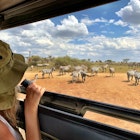
Nov 15, 2023 • 6 min read
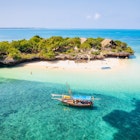
Sep 19, 2023 • 5 min read

Oct 23, 2022 • 6 min read
How can we help you?
Find answers to popular travel questions. Search above or browse by topic below
Travel Advice
Tanzania travel advice.
Entry requirements differ by country. The Foreign Commonwealth and Development Office issues country specific travel advice including Health, Visa and Vaccination requirements.
You can access the FCDO advice for Tanzania at https://www.gov.uk/foreign-travel-advice/tanzania
Entry requirements:
- Entry requirements: You do not need to show a COVID vaccination certificate or negative COVID test to enter Tanzania. Health officials may screen you for COVID symptoms on arrival and may also randomly select travellers for rapid antigen testing.
Passport validity:
- Your passport should be valid for 6 months from the date you arrive in Tanzania.
Visa requirements:
- General: All British passport holders need a tourist or business visa to enter Tanzania. If you are planning to work or volunteer, you will need a valid work permit.
- e-Visa requirements: Apply for an e-Visa through the Tanzanian immigration website
- Visa on arrival: Possible to get a single-entry tourist or business visa at main ports of entry, subject to fulfilling all immigration requirements. Multiple entry visas are not available on arrival.
Travel forms:
- Yellow fever certificate requirements: Check the TravelHealthPro website to see if you need a yellow fever certificate.
- UK Emergency Travel Documents: Accepted for entry, airside transit, and exit from Tanzania with a minimum of 6 months' validity.
Irish Passport Holders
Please note that this information is for British Passport holders only. If you hold an Irish passport then please visit the Department of Foreign Affairs for travel advice
Help Centre Topics
Before you book.
Here you’ll find answers to any questions you may have before booking your holiday, escorted tour or river cruise.
Before You Travel
We want to make preparing for your holiday as easy as possible. Find answers to your pre-departure questions here.
If you are currently on holiday or have any questions about what to expect you will find the answers here.
After Your Holiday
Just returned from your holiday? Then this is where you’ll find answers to any questions you may have.
Airports & Flights
You’ll find information on any questions you may have about your airline and airports here.
General advice on travel abroad including COVID-19, country specific information and other useful tips.
Tanzania Travel Restrictions
Traveller's COVID-19 vaccination status
Travelling from the United Kingdom to Tanzania
Open for vaccinated visitors
COVID-19 testing
Not required
Not required for vaccinated visitors
Restaurants
Not required in public spaces.
Ready to travel?
Find flights to tanzania, find stays in tanzania, explore more countries on travel restrictions map, destinations you can travel to now, netherlands, new zealand, philippines, switzerland, united arab emirates, united states, know when to go.
Sign up for email alerts as countries begin to open - choose the destinations you're interested in so you're in the know.
Can I travel to Tanzania from the United Kingdom?
Most visitors from the United Kingdom, regardless of vaccination status, can enter Tanzania.
Can I travel to Tanzania if I am vaccinated?
Fully vaccinated visitors from the United Kingdom can enter Tanzania without restrictions.
Can I travel to Tanzania without being vaccinated?
Unvaccinated visitors from the United Kingdom can enter Tanzania without restrictions.
Do I need a COVID test to enter Tanzania?
Visitors from the United Kingdom are not required to present a negative COVID-19 PCR test or antigen result upon entering Tanzania.
Can I travel to Tanzania without quarantine?
Travellers from the United Kingdom are not required to quarantine.
Do I need to wear a mask in Tanzania?
Mask usage in Tanzania is not required in public spaces.
Are the restaurants and bars open in Tanzania?
Restaurants in Tanzania are open. Bars in Tanzania are .
- Travel advice
Tanzania travel advice
Explore our complete guide to Tanzania with the latest travel advice for travellers and holidaymakers including official updates and local travel tips for Tanzania.
- Essential travel guide
- Weather & climate
- Travel health
- Covid live updates
- Travel features
- Top travel deals
- Destinations
Tanzania travel guide - essential info
Below is a beginner's guide to Tanzania with essential travel facts such as dominant language spoken, typical flight time from the UK and the local currency. You can also check whether visas are required and what plug adapter you need to pack.
Why visit Tanzania?
Considering a holiday to the Tanzania? Here are some of the very good reasons it makes such a wonderful holiday destination be it for beaches or culture to ensure you get the most out of your 2024/2025 escape.
Tanzania tourist information
✝ = Typical flight time from the UK and visa requirements for UK travellers.
Recommended for Tanzania

Tanzania deals >>
Back to top
Tanzania weather
The Tanzania weather guide shows long term monthly averages for Dar es Salaam .
Tanzania destinations >>
TUI: up to 7% off holidays booked online

- Book online with TUI & save up to 7% on holidays
- FREE child places available for select holidays
- Pay £0 deposits with direct debit & spread the cost
View all TUI offers
TUI deal finder
Destination Any destination Algarve Costa Blanca Costa del Sol Crete Croatia Cyprus Egypt Florida Fuerteventura Gran Canaria Ibiza Italy Lanzarote Madeira Majorca Malta Rhodes Santorini Tenerife Thailand Turkey Zante Africa North Africa Cape Verde Egypt Gambia Kenya Morocco Senegal Tanzania Tunisia Asia Far East South East Asia Southern Asia India Indonesia Jordan Oman Qatar Sri Lanka Thailand UAE Austrian Alps Formentera Ibiza Majorca Menorca Ontario Quebec Fuerteventura Gran Canaria La Gomera La Palma Lanzarote Tenerife Caribbean Antigua Aruba Bahamas Barbados Cuba Curacao Dominican Republic Grenada Jamaica St Lucia Trinidad and Tobago Central America Costa Rica Red Sea Europe Austria Belgium Croatia Cyprus Czech Republic Denmark Finland France Germany Gibraltar Greece Hungary Iceland Italy Jersey Lapland Luxembourg Malta Monaco Netherlands North Macedonia Norway Poland Portugal Romania Slovenia Spain Sweden Switzerland Turkey Alps Orlando South of France Corfu Crete Halkidiki Kefalonia Kos Lefkas Mykonos Naxos Paros Paxos Peloponnese Rhodes Samos Santorini Skiathos Skopelos Thassos Zante Goa Indian Ocean Maldives Mauritius Seychelles Bali Lombok Calabria Campania Italian Lakes Italian Riviera Sardinia Sicily Tuscany Venetian Riviera Dolomites Puglia Mediterranean Caribbean Coast Middle East North America Canada Mexico USA Algarve Madeira Scandinavia Balearic Islands Canary Islands Costa Almeria Costa Blanca Costa Brava Costa de la Luz Costa del Sol Costa Dorada Swiss Alps Antalya Coast Bodrum and Izmir Coast Dalaman and Marmaris Coast Dubai California D.C. Florida Illinois Louisiana Massachusetts Nevada New York
Check the latest travel advice on visiting Tanzania from official government sources (in english) from around the world including entry requirements and travel restrictions.
- UK traveller advice for Tanzania - UK FCDO
- Irish traveller advice for Tanzania - Department of Foreign Affairs, Ireland
- Canadian travel advice for Tanzania - Government of Canada
- US travel advisories for Tanzania - US Department of State
- Safe travel advisories for Tanzania - Ministry of Foreign Affairs, New Zealand
- Smarter traveller advice for Tanzania - Department of Foreign Affairs, Australia
Learn more about the current safety and security risks from terrorism, natural disasters and more. Read about the local laws and customs to consider when travelling around Tanzania.
Note : UK FCDO - UK Foreign, Commonwealth & Development Office
FCDO travel advice
Destination Any destination France Germany Greece India Italy Portugal Spain Turkey USA Algeria Angola Benin Botswana Burkina Faso Burundi Cameroon Cape Verde Central African Republic Chad Congo-Brazzaville Congo-Kinshasa Djibouti Egypt Equatorial Guinea Eritrea Eswatini Ethiopia Gabon Gambia Ghana Guinea Guinea-Bissau Ivory Coast Kenya Lesotho Liberia Libya Malawi Mali Mauritania Morocco Mozambique Namibia Niger Nigeria Rwanda Sao Tome and Principe Senegal Sierra Leone Somalia South Africa South Sudan St Helena, Ascension and Tristan da Cunha Sudan Tanzania Togo Tunisia Uganda Western Sahara Zambia Zimbabwe Falkland Islands South Georgia and South Sandwich Islands Afghanistan Armenia Azerbaijan Bahrain Bangladesh Bhutan Brunei Cambodia China East Timor Gaza Strip Georgia Hong Kong India Indonesia Iran Iraq Israel Japan Jordan Kazakhstan Kuwait Kyrgyzstan Laos Lebanon Macau Malaysia Maldives Mongolia Myanmar Nepal North Korea Oman Pakistan Philippines Qatar Russia (Central Asia) Russia (Far East) Saudi Arabia Singapore South Korea Sri Lanka Syria Taiwan Tajikistan Thailand Turkmenistan UAE Uzbekistan Vietnam West Bank Yemen Anguilla Antigua Aruba Bahamas Barbados Bonaire British Virgin Islands Cayman Islands Cuba Curacao Dominica Dominican Republic Grenada Guadeloupe Haiti Jamaica Martinique Montserrat Saba Sint Eustatius Sint Maarten St Barthelemy St Kitts and Nevis St Lucia St Martin St Vincent and the Grenadines Trinidad and Tobago Turks and Caicos Islands Belize Costa Rica El Salvador Guatemala Honduras Nicaragua Panama Albania Andorra Austria Belarus Belgium Bosnia and Herzegovina Bulgaria Croatia Cyprus Czech Republic Denmark Estonia Faroe Islands Finland France Germany Gibraltar Greece Hungary Iceland Ireland Italy Jan Mayen Kosovo Latvia Liechtenstein Lithuania Luxembourg Macedonia Malta Moldova Monaco Montenegro Netherlands Norway Poland Portugal Romania Russia San Marino Serbia Slovakia Slovenia Spain Svalbard Sweden Switzerland Turkey Ukraine British Indian Ocean Territory Comoros Madagascar Mauritius Mayotte Reunion Seychelles Bermuda Canada Greenland Mexico St Pierre and Miquelon USA Australia Federated States of Micronesia Fiji French Polynesia Kiribati Marshall Islands Nauru New Caledonia New Zealand Palau Papua New Guinea Pitcairn Island Samoa Solomon Islands Tonga Tuvalu Vanuatu Wallis and Futuna Argentina Bolivia Brazil Chile Colombia Ecuador French Guiana Guyana Paraguay Peru Suriname Uruguay Venezuela
Tanzania travel health
Find out more about staying safe when travelling to Tanzania with the latest guidance on required vaccinations and recommended medication to take with you.
- Vaccines & medicines for Tanzania - CDC
- Health & vaccinations for Tanzania - TravelHealthPro, NaTHNac
- How to stay safe & healthy in Tanzania - Fit for Travel, Public Health Scotland
Check out the general travel tips for staying safe and healthy in Tanzania, risks of preventable diseases and what to pack.
Note : CDC - Centers for Disease Control and Prevention
Tanzania covid live updates
Check the latest live updates on Covid-19 in Tanzania with the vaccination requirements, current available statistics and up-to-date travel advice from government agencies.
- Coronavirus timeline in Tanzania - Our World in Data
Tanzania travel features
Do you want to learn more about Tanzania? Read our latest features covering travel tips and insider destination guides on where to go and what to do in Tanzania.
We don't currently have any travel features on Tanzania. Discover more about holiday destinations around the world with this selection of general travel articles.
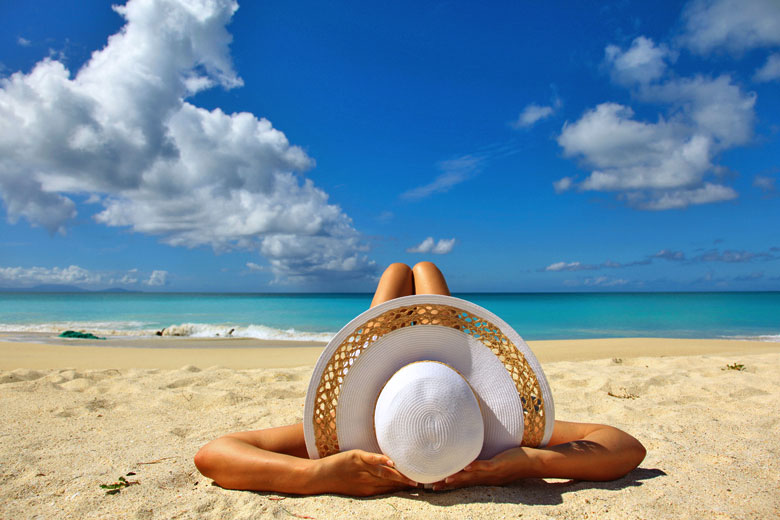
Tanzania FAQs
Read our frequently asked questions about travelling to Tanzania including the current entry restrictions, covid rules, driving side, electrical plugs used and much more.
Are there entry restrictions to Tanzania due to Covid-19?
Tanzania is open for tourism from the UK. There are no special entry requirements for Tanzania.
Do I need to quarantine in the UK if I travel from Tanzania?
You do not need to quarantine on arrival in the UK from Tanzania. The UK no longer requires a passenger locator form, Covid-19 test or proof of vaccination.
What is the flight time to Tanzania from the UK?
The flight time to Tanzania from the UK is typically 11.5 to 13 hours .
Flights to Tanzania

What is the time difference between Tanzania and the UK?
The time difference between Tanzania and the UK is UK time+3 hours .
What is the main language spoken in Tanzania?
The main languages spoken in Tanzania are Swahili and English . Learn a language for Tanzania with Rosetta Stone * , Busuu * and Rocket Languages * .
What is the currency in Tanzania?
The currency in Tanzania is the Tanzanian Shilling ( TZS ). Send money to Tanzania with Wise.com * and World Remit * .
Which plugs are used in Tanzania?
Tanzania uses electrical plug type D + G (230 Volts) .
Which side of the road do they drive on in Tanzania?
They drive on the left side of the road in Tanzania. Find out more about driving in Tanzania with International Drivers Association * .
Transport options for Tanzania

Do you need a visa for Tanzania?
Yes, UK passport holders do need a visa to enter Tanzania. Check Tanzania visa requirements for all passport holders with VisaHQ * and iVisa.com * .
Travel advice by country
Country name All countries - summary Algarve Balearic Islands Barbados Canary Islands Croatia Cyprus Egypt Faroe Islands France Germany Greece Ireland Italy Jamaica Madeira Maldives Malta Portugal Spain Turkey UAE UK USA Algeria Angola Benin Botswana Burkina Faso Burundi Cameroon Cape Verde Central African Republic Chad Congo-Brazzaville Congo-Kinshasa Djibouti Egypt Equatorial Guinea Eritrea Ethiopia Gabon Gambia Ghana Guinea Guinea-Bissau Ivory Coast Kenya Lesotho Liberia Libya Malawi Mali Mauritania Morocco Mozambique Namibia Niger Nigeria Rwanda Sao Tome and Principe Senegal Sierra Leone Somalia South Africa South Sudan Sudan Swaziland Tanzania Togo Tunisia Uganda Western Sahara Zambia Zimbabwe Antarctica French Southern and Antarctic Lands South Georgia and South Sandwich Islands Afghanistan Armenia Azerbaijan Bahrain Bangladesh Bhutan Brunei Cambodia China East Timor Georgia Hong Kong India Indonesia Iran Iraq Israel Japan Jordan Kazakhstan Kuwait Kyrgyzstan Laos Lebanon Macau Malaysia Maldives Mongolia Myanmar Nepal North Korea Oman Pakistan Philippines Qatar Russia (Central Asia) Russia (Far East) Saudi Arabia Singapore South Korea Sri Lanka Syria Taiwan Tajikistan Thailand Turkmenistan UAE Uzbekistan Vietnam Yemen Anguilla Antigua Aruba Bahamas Barbados Bonaire British Virgin Islands Cayman Islands Cuba Curacao Dominica Dominican Republic Grenada Guadeloupe Haiti Jamaica Martinique Montserrat Puerto Rico Saba Sint Eustatius Sint Maarten St Barthelemy St Kitts and Nevis St Lucia St Martin St Vincent and the Grenadines Trinidad and Tobago Turks and Caicos Virgin Islands Belize Costa Rica El Salvador Guatemala Honduras Nicaragua Panama Albania Andorra Austria Belarus Belgium Bosnia and Herzegovina Bulgaria Croatia Cyprus Czech Republic Denmark Estonia Faroe Islands Finland France Germany Gibraltar Greece Guernsey Hungary Iceland Ireland Isle of Man Italy Jan Mayen Jersey Kosovo Latvia Liechtenstein Lithuania Luxembourg Malta Moldova Monaco Montenegro Netherlands North Macedonia Norway Poland Portugal Romania Russia San Marino Serbia Slovakia Slovenia Spain Svalbard Sweden Switzerland Turkey UK Ukraine British Indian Ocean Territory Christmas Island Cocos (Keeling) Islands Comoros Madagascar Mauritius Mayotte Reunion Seychelles Bermuda Canada Greenland Mexico St Pierre and Miquelon USA American Samoa Australia Cook Islands Federated States of Micronesia Fiji French Polynesia Guam Kiribati Marshall Islands Midway Island Nauru New Caledonia New Zealand Niue Norfolk Island Northern Mariana Islands Palau Papua New Guinea Pitcairn Island Samoa Solomon Islands Tokelau Tonga Tuvalu Vanuatu Wake Island Wallis and Futuna Algarve Azores Madeira Argentina Bolivia Brazil Chile Colombia Ecuador Falkland Islands French Guiana Guyana Paraguay Peru Suriname Uruguay Venezuela Balearic Islands Canary Islands England Northern Ireland Scotland Wales Alabama Alaska Arizona Arkansas California Colorado Connecticut D.C. Delaware Florida Georgia Hawaii Idaho Illinois Indiana Iowa Kansas Kentucky Louisiana Maine Maryland Massachusetts Michigan Minnesota Mississippi Missouri Montana Nebraska Nevada New Hampshire New Jersey New Mexico New York North Carolina North Dakota Ohio Oklahoma Oregon Pennsylvania Rhode Island South Carolina South Dakota Tennessee Texas Utah Vermont Virginia Washington West Virginia Wisconsin Wyoming
Be inspired
Get your weekly fix of holiday inspiration from some of the world's best travel writers plus save on your next trip with the latest exclusive offers
We promise not to share your details
Explore holidays in the sun for less
- Beach holidays
- Family holidays
- City breaks
- Summer holidays
- Winter sun holidays
- Holiday offers
- Top travel brands
- Airlines & flights
- Discount hotels
- Airport parking deals
- Jet2holidays
- easyJet holidays
- Love Holidays
- British Airways
More holidays
Airport parking
- Manchester Airport
- Stansted Airport
- Bristol Airport
- Luton Airport
- Birmingham Airport
- Edinburgh Airport
- Gatwick Airport
- Glasgow Airport
- Newcastle Airport
More parking
Airport lounges
- Heathrow Airport
More lounges
- Pinterest (1 share)
This website uses cookies that help the website function and to help us understand how users interact with it. We use these cookies to provide you with an improved customised user-experience. Please confirm if you consent to the use of non-essential cookies on this website. Please note that performance cookies will be set only if you accept all cookies. Learn about the cookies we use on our website.
Necessary cookies enable core functionality such as security, network management, and accessibility. You may disable these by changing your browser settings, but this may affect how the website functions.
We'd like to set performance cookies to help us to improve our website by collecting and reporting information on how you use it. The cookies collect information in a way that does not directly identify anyone. For more information on how these cookies work, please see our Cookie Policy .
Latest Nomad News
Official travel advice.
17 March 2020
Our advice to you all is to keep up to date with travel advisories from your country.
Here are some key links to send you in the right direction:
UK Foreign Office – https://www.gov.uk/foreign-travel-advice/tanzania
US Travel Advisory - https://travel.state.gov/content/travel/en/international-travel/International-Travel-Country-Information-Pages/Tanzania.html
European Union Travel Advisory - https://ec.europa.eu/consularprotection/content/travel-advice_en
Australia Travel Advisory - https://www.smartraveller.gov.au/search?search=Tanzania
If you need any further advice on where to look for information please give us a shout on [email protected] . We’re here to help.
Share article
More articles
Enhancing lives, introducing the nomad film unit.
Nomad is a company full of stories. Many of them go way back to the early days, ...
Nomad and the green season
For us at Nomad the green season is quite simply our favourite time of year in n...
Life long learning & growth
Sand rivers superstars shine bright.
Wherever possible we look to inspire the next generation to realise the importan...
Health & wellbeing
A bright future lies ahead for amina.
Amina is a 14-year-old girl, she lives in Mamire on the edge of Tarangire Nation...
Making the most of your stay at Entamanu
Visiting Entamanu Ngorongoro means more than just checking in and checking out e...
Nomad Camps. Small is beautiful.
Tanzania’s prime locations and smallest safari lodges. Plus a guaranteed private...
Conservation & environment
Food in nomad camps.
Delicious food is a huge part of the safari experience; be under no illusions, y...
Mkombe’s Story
Mkombe was an inspirational man, always smiling, extraordinary with children and with an exuberance for Africa's wild places that we all share.
100,000 cups of coffee
Mama Ali is one of Nomad’s longest serving staff members, and she has certainly served the most - cups of coffee that is.
"Kigelia is a rather unique, old fashioned exclusive and genuine safari away from the crowds. Very special even for the ...
Tall Tails from Tanzania - These gentle giants remind us to always reach for new heights. Celebrate #WorldGiraffeDay wit...
It's been a wild start to the week in Kigelia with some big characters joining us in camp. Beginning with this show of s...
Lamai has been nominated for Tanzania's Leading Safari Lodge 2024 at the World Travel Awards @worldtravelawards. This ...
Newsletter sign up
All the news, delivered straight to your inbox...
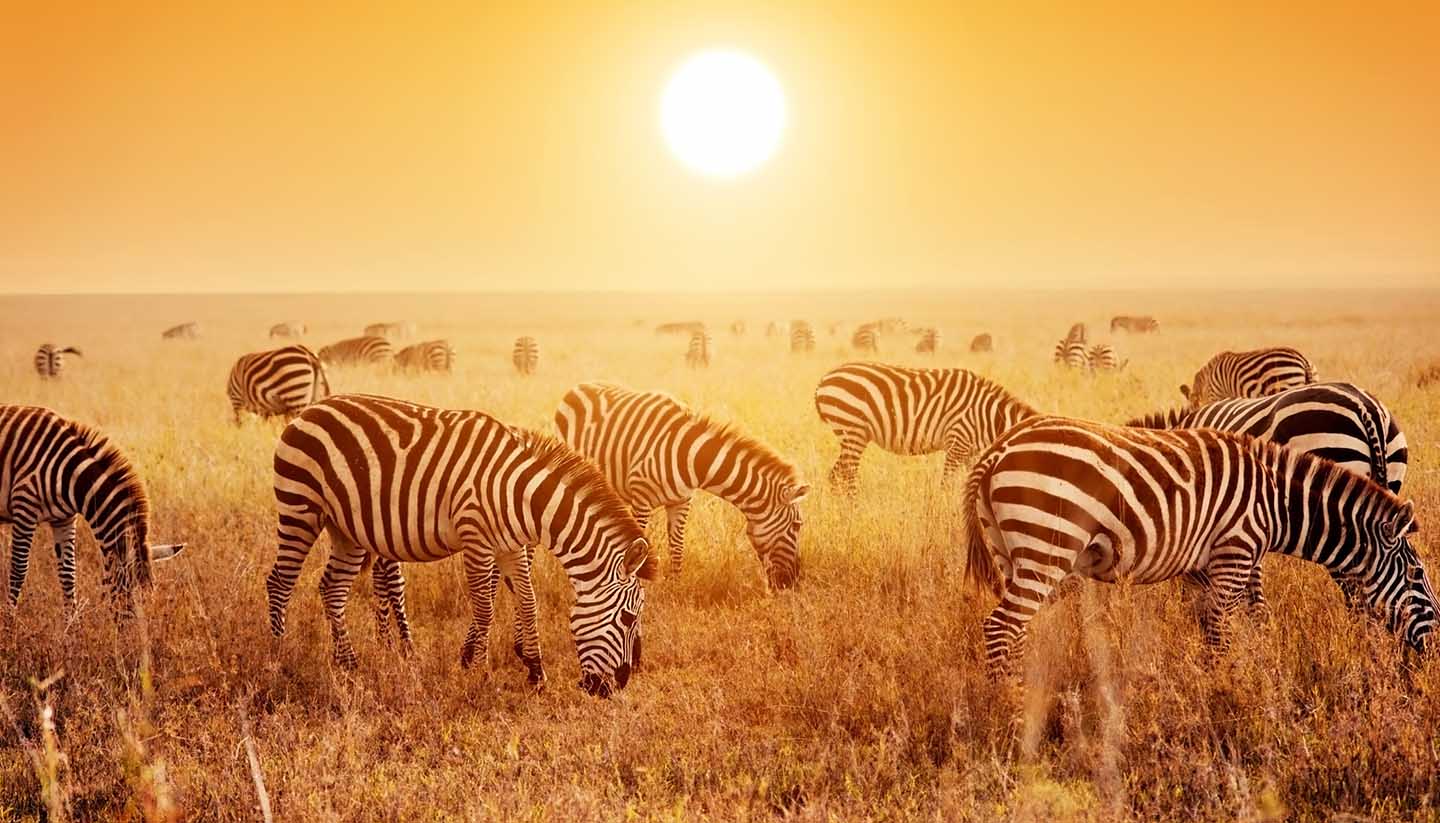
Introducing Tanzania
About tanzania.
- Images of Tanzania
- History, language & culture
- Weather & geography
- Doing business & staying in touch
Plan your trip
- Travel to Tanzania
- Where to stay
While you’re there
- Things to see & do
- Shopping & nightlife
- Food & drink
- Getting around
Before you go
- Passport & visa
- Public Holidays
- Money & duty free
Book your flights
- Dar es Salaam
- Dar es Salaam Julius Nyerere International Airport
Tanzania travel guide
If you close your eyes and conjure up the quintessential romantic image of Africa, what you’ll most likely imagine is Tanzania: the drama of the wildebeest migration along a seemingly-endless savannah; the incongruous snow and glaciers of Mt Kilimanjaro; the iconic and statuesque Maasai warriors; the exotic palm-fringed beaches on the spice islands of Zanzibar. It’s all here.
Tanzania boasts some of the most impressive national parks and game reserves in Africa. The Serengeti National Park is considered the continent’s premier spot to see wildlife roam unheeded across vast open plains.
Nearby, within the steep walls of the Ngorongoro Crater lies the most densely concentrated population of African mammals on earth. Not to be forgotten, the Selous Game Reserve is larger than Switzerland, and is wild, remote and still virtually untouched by humans.
Even further from the beaten path are parks in the extreme west of the country which offer the unique opportunity to track chimpanzees in their natural habitat on the fringes of Lake Tanganyika, one of Africa’s Great Lakes.
Beyond its safari stalwarts, Tanzania has no less than 804km (503 miles) of sublime coastline and pearly-white beaches with some magnificent islands offshore. Known as the Swahili Coast, this was a favoured stop on ancient trading routes between the Indian sub-continent and the Middle East. Spices, jewels and slaves once passed through, bringing with them a mélange of cultural riches that remain today.
Tanzania’s not short on mountains either. The striking and snow-capped Mt Kilimanjaro is Africa's tallest at 5,895m (19,341ft) and climbing it is an unforgettable experience. Its slightly smaller sister Mt Meru is arguably even prettier, and a quicker climb.
Tanzania is home to more than 120 different ethnic groups and cultures, but it has seen little of the ethnic or religious-based violence that has afflicted certain other nations in the region. In fact the country is an inherently peaceful place and embraces its multicultural heritage, which adds to its broad appeal.
945,087 sq km (364,900 sq miles).
55,155,473 (UN estimate 2016).
54 per sq km.
Federal republic.
President Samia Suluhu Hassan since 2021. Zanzibar is semi-autonomous and has its own parliament and president (President Hussein Mwinyi since 2020).
Kassim Majaliwa since 2015.
Travel Advice
The Foreign, Commonwealth & Development Office ( FCDO ) provides advice about risks of travel to help British nationals make informed decisions. Find out more about FCDO travel advice .
Areas where FCDO advises against all but essential travel
Your travel insurance could be invalidated if you travel against FCDO advice.
Mtwara Region along the Tanzania-Mozambique border
FCDO advises against all but essential travel to within 20km of the Tanzanian border with Cabo Delgado Province in Mozambique.
This is due to attacks by groups linked with Islamic extremism.
Find out more about why FCDO advises against travel .
Before you travel
No travel can be guaranteed safe. Read all the advice in this guide and any specific travel advice that applies to you:
- women travellers
- disabled travellers
LGBT+ travellers
Follow and contact FCDO travel on Twitter , Facebook and Instagram . You can also sign up to get email notifications when this advice is updated.
Travel insurance
If you choose to travel, research your destinations and get appropriate travel insurance . Insurance should cover your itinerary, planned activities and expenses in an emergency.
This advice reflects the UK government’s understanding of current rules for people travelling on a full ‘British citizen’ passport from the UK, for the most common types of travel.
The authorities in Tanzania set and enforce entry rules. If you’re not sure how these requirements apply to you, contact the Tanzania High Commission in the UK .
COVID-19 rules
There are no COVID-19 testing or vaccination requirements for travellers entering Tanzania.
Passport validity requirements
To enter Tanzania, your passport must have an ‘expiry date’ at least 6 months after the date you arrive and at least one blank page.
Check with your travel provider that your passport and other travel documents meet requirements. Renew your passport if you need to.
You will be denied entry if you do not have a valid travel document or try to use a passport that has been reported lost or stolen.
Visa requirements
You must have a tourist or business visa to enter Tanzania.
If you are planning to work or volunteer, you will also need a work permit. Information on how to apply is available from the Tanzanian Prime Minister’s Office .
Your employer or volunteer organisation should help you arrange this before you travel.
If you overstay your visa or permit you can be arrested, detained and fined before being deported.
The Tanzanian Immigration Department has more information on visas .
Applying for a visa
Apply for an ‘e-visa’ before you travel. It is no longer possible to get a visa from the Tanzanian High Commission in London.
You can also get a tourist or business visa for a single entry on arrival at the main ports of entry to Tanzania , subject to meeting all immigration requirements. You may be asked to provide proof of your return journey. You will not be able to get a multiple entry visa on arrival.
Checks at border control
You must be ready to show your return or onward ticket at border control.
Vaccination requirements
To enter Tanzania, you must have a certificate to prove you’ve had a yellow fever vaccination if you’re coming from a country listed as a transmission risk .
For full details about medical entry requirements and recommended vaccinations, see TravelHealthPro’s Tanzania guide .
Customs rules
There are strict rules about goods you can take into or out of Tanzania. You must declare anything that may be prohibited or subject to tax or duty.
Taking wildlife products into and out of Tanzania
Do not bring animal skin accessories into Tanzania as you risk questioning or detention when leaving the country.
Border officials have arrested foreigners for trying to take wildlife items they’ve bought, including horns and seashells, out of the country. It’s illegal to do this without a certified export permit from the Ministry of Natural Resources and Tourism. If you’re caught you can be detained or fined.
This guide also has safety advice for regions of Tanzania .
There is a high threat of terrorist attack globally affecting UK interests and British nationals, including from groups and individuals who view the UK and British nationals as targets. Stay aware of your surroundings at all times.
UK Counter Terrorism Policing has information and advice on staying safe abroad and what to do in the event of a terrorist attack. Find out how to reduce your risk from terrorism while abroad .
Terrorism in Tanzania
Terrorists are likely to try and carry out attacks in Tanzania.
Terrorist attacks could be indiscriminate, including in places frequented by foreign nationals, such as:
- places of worship
- transport hubs
- restaurants
- major gatherings like sporting or religious events
- crowded places
Stay aware of your surroundings, keep up to date with local media reports and follow the advice of local authorities.
Extremists linked to the Islamic terrorist group Al-Shabaab based in Somalia pose a threat across the East Africa region, and are thought to be active in Tanzania. Attacks by IS-Mozambique, who are based in the Cabo Delgado province of Mozambique, are possible near Tanzania’s border with this area of Mozambique. There is also thought to be some support for Daesh (formerly referred to as ISIL). The Tanzanian authorities have successfully made a number of arrests in connection to terrorism. However, many incidents in Tanzania are of unclear origin and may be conducted by criminal gangs.
In 2020, the village of Kitaya in the Mtwara region was attacked, close to the border with Mozambique, the attack was claimed by Islamic extremists operating from northern Mozambique. Most attacks target the local security forces, although attacks against western interests are also possible.
Political situation
On occasion demonstrations and political rallies across Tanzania have turned violent, resulting in fatalities. Police may use tear gas or live ammunition for crowd control. If you’re in and around areas where demonstrations are taking place, be aware of what is happening around you and move away if there are signs of disorder.
Violent crime
There is a risk of armed crime, including armed robbery, throughout Tanzania. Take particular care in places frequented by tourists and foreign residents. In Dar es Salaam, tourists and residents have been targeted:
- in the city centre
- in the Masaki and Oysterbay peninsula area, particularly at Coco Beach
- along Toure Drive
In Zanzibar incidents have taken place in Stone Town and at hotels and on popular tourist beaches throughout the island.
Bag snatching is a well-known tactic of criminals, who may operate from cars or motorbikes. If you are walking on the street:
- walk towards the traffic so you can see vehicles approaching
- walk as far away from the road as possible
- carry bags loosely by the handle or hanging off your shoulder and do not secure the strap across your chest
- avoid walking or cycling at night or alone
Do not carry large amounts of cash or display valuables such as expensive jewellery or watches. Leave your passport in a safe place and carry a copy for ID checks.
When in a vehicle, keep car doors locked, windows up and valuables out of sight. Be particularly careful at night when there is a higher incidence of crime. Do not stop if pedestrians or hitchhikers try to flag you down.
Express kidnap
In Dar es Salaam, tourists have been ‘express kidnapped’. This means they’ve been assaulted, robbed and forced with the threat of violence to withdraw cash from ATMs. Some have been forced to arrange cash transfers of up to £5,000 through Western Union after being befriended by strangers or getting into unlicensed taxis.
Protecting your property
Burglary is a risk. Make sure residential property is secure and lock all doors and windows, especially at night. If where you’re staying has a security guard, they should insist on official identification before allowing anyone to enter your property or compound. If in doubt, do not let strangers in and raise the alarm.
There have been cases where women travelling alone and in small groups have been verbally harassed.
Laws and cultural differences
There is a high proportion of Muslims in Tanzania, particularly in Zanzibar and Pemba. Respect local traditions, customs, laws and religions. Make sure your actions do not cause offence, especially during the holy month of Ramadan or if you intend to visit religious areas.
Personal ID
Always carry copies of your passport photo page and visa. Carry your work permit, if you have one. Immigration officials or police can request these documents at any time, so make sure you can get the originals quickly if you need them. If you’re a resident or longer term visitor, consider getting certified copies.
Ramadan is a holy month for Muslims. The dates vary by year and country. During this time, avoid eating or drinking in public, outside of hotels or restaurants. Get more advice when you arrive from your tour guide, hotel or business contacts.
Dress modestly throughout Tanzania. Women wearing shorts or sleeveless tops away from tourist resorts in Zanzibar and Pemba, particularly in Stone Town, may cause offence to the local population.
Zanzibari authorities can fine you 700 US dollars or more if you’re wearing what they consider inappropriate clothing in public. For guides or tour operators, the fine can be at least 1,000 US dollars.
Environmental laws
Plastic bags are banned for environmental reasons. If you arrive by air you’ll be asked to hand over all plastic bags on arrival. The ban does not include ‘ziplock’ bags for airline security procedures.
Illegal drugs and prison sentences
Tanzania has strict laws on drug use and if you are found in possession of even a small amount you will be fined. There are severe penalties, including prison sentences, for possessing an amount that indicates possible intent to supply (drug trafficking). Tanzanian prisons tend to be dirty and overcrowded.
Discrimination and harassment
Reports made to the British High Commission by Black, Asian and Minority Ethnic (BAME) British passport holders suggest that they are experiencing additional levels of harassment from immigration officials. If this happens, stay calm and ask that the British High Commission is immediately informed.
Same-sex sexual activity is illegal in Tanzania, including Zanzibar. Same-sex relationships are not tolerated in Tanzania’s conservative society. If you show affection in public, like holding hands or kissing in public places, you could be arrested or put in prison.
Read more advice for LGBT+ travellers .
US dollars are widely accepted in tourist areas. Travellers cheques are not widely accepted.
Most banks in major cities have ATMs that accept foreign debit cards and issue Tanzanian shillings. They sometimes break down or run out of money.
To minimise the risk of card cloning, use ATMs located within the bank. If you try to exchange non-Bank of England pound notes, you may get a reduced exchange rate.
Outdoor activities and adventure tourism
Trekking and climbing .
If you are trekking or climbing, only use a reputable travel company, stick to established routes and always walk in groups. Make sure you are well prepared and equipped to cope with the terrain and low temperatures.
Transport risks
Road travel.
If you’re planning to drive in Tanzania, see information on driving abroad .
The condition of cars rented out by some car hire companies is variable, so use a reputable firm. There are no roadside rescue or breakdown services. Road maps are hard to come by and not always up to date. Service stations are infrequent and may not have supplies of fuel. Consider using reputable taxis as an alternative.
You can drive in Tanzania with a UK driving licence for up to 6 months. For stays longer than this, an international driving permit ( IDP ) is required. Keep this with you in the car. To confirm the correct IDP to use, contact the Tanzanian High Commission in the UK .
To drive in Zanzibar, you’ll also need a local Zanzibar driving permit (which you can get through your hire car company). Carry several copies of your driving licence, permits and insurance documents.
Driving standards and road conditions
Road users often drive dangerously, ignoring the rules of the road. Accidents resulting in death and serious injury are common.
Watch out for:
- vehicles and motorbikes trying to undertake or overtake using any lane, including on the hard shoulder
- drivers making manoeuvres without signalling
- poor attention to rules at roundabouts
Many roads need repair, including in major towns and cities. During the rainy season, flooding can cause landslides and road surfaces can deteriorate.
Roads in Tanzania’s national parks, mainly dirt tracks, can become hazardous or impassable after heavy rain. It may be essential to have a 4-wheel drive vehicle.
Avoid driving outside major towns and cities at night.
Police checkpoints
There are frequent police checkpoints. If you’re stopped by the police, ask to see identification. If you are issued with a fine, the police should give you a government control number for payment. The police should not ask you to make any on the spot payments for traffic violations. If you’re involved in a road accident, co-operate with the local police.
If you see an unusual incident, or if somebody in plain clothes tries to flag you down, it is often safer not to stop.
Buses and taxis
Local buses (‘dala dalas’), motorbike taxis (‘boda bodas’), and tuk-tuks (known locally as ‘bijajis’) do not meet western safety standards. They are often poorly maintained and badly driven. They rarely have proper insurance cover. There are frequent accidents, some of which result in fatalities.
Do not accept lifts from strangers or anyone offering to find a taxi for you. It is safest to arrange a taxi through a hotel or travel operator. Always ask to see the driver’s ID and use reputable taxi services.
Pickpockets and bag-snatchers operate on overcrowded buses and at bus stations.
Rail travel
There have been several accidents on Tanzanian railways. Seek local advice for any long-distance train travel.

Lake and sea travel
In the last few years there have been several ferry disasters. Hundreds of people have died when travelling:
- between Dar es Salaam and Zanzibar
- between the islands of Zanzibar
- in the Lake Zone area
If you think a ferry is overloaded or not seaworthy, do not get on. If you do board, familiarise yourself with emergency procedures on board and make a note of where the life jackets and emergency exits are located.
You should also beware of aggressive ticket touts at Tanzanian ports.
Continual pirate attacks on vessels sailing off the coast of Somalia and in the Gulf of Aden show that the threat of piracy remains significant. The threat assessment of the combined international naval counter-piracy forces is that all sailing yachts under their own passage should avoid the designated high-risk area or accept the risk of being hijacked and held hostage for ransom. For more information and advice, see Piracy and armed robbery at sea .
Extreme weather and natural disasters
Rainy seasons.
The length of rainy seasons can vary, but they generally run from:
- the end of March to May
- October to mid-December
Heavy rainfall and strong winds can affect travel. Flooding and landslides can occur during heavy rain. If travelling to affected regions, you should take extra care and follow any advice given by the local authorities.
Monitor local and international weather reports and the TMA website for the latest updates. If travelling, plan your journeys carefully and make sure to follow local guidance.
Avoid walking, swimming, or driving through floodwater.
Find out what you can do to prepare for and respond to extreme weather and natural hazards .
Earthquakes
Earthquakes and tremors are a risk in Tanzania. The US Federal Emergency Management Agency website has advice about what to do before, during and after an earthquake .
The last significant earthquake (magnitude 6.0) happened on 12 August 2020, 66km north-east of Mafia Island.
This section has safety advice for regions of Tanzania. It only covers regions where The Foreign, Commonwealth & Development Office ( FCDO ) has specific advice.
You should also read FCDO ’s overall travel advice and safety and security advice .
Mtwara Province
FCDO advises against all but essential travel to the southern strip of Mtwara Province to within 20km of the border with Cabo Delgado Province in Mozambique.
The presence of groups linked to Islamic extremism in Cabo Delgado is creating cross-border tensions and instability. There is a risk of violent attacks. An attack on Kitaya village in October 2020 was claimed by groups linked to Islamic extremism operating from northern Mozambique.
Tanzania-Burundi border and Kigoma region
There have been armed robberies in the area bordering Burundi and in Kigoma region, including vehicle hijackings. Drive only in hours of daylight. There are few facilities for visitors.
National parks
Some parks are extremely remote, and emergency access and evacuation can be difficult. If you choose to camp, only use official sites. Make sure you are properly equipped and seek local advice when travelling to isolated areas.
There are risks associated with viewing wildlife, particularly on foot or at close range. Always follow park regulations and advice from wardens, and make sure you have the correct documentation or permit before entering a national park.
Before you travel check that:
- your destination can provide the healthcare you may need
- you have appropriate travel insurance for local treatment or unexpected medical evacuation
This is particularly important if you have a health condition or are pregnant.
Emergency medical number
Call 112 and ask for an ambulance.
Contact your insurance company quickly if you’re referred to a medical facility for treatment.
Vaccinations and health risks
At least 8 weeks before your trip check:
At least 8 weeks before your trip:
- check the latest vaccine recommendations for Tanzania
- see where to get vaccines and whether you have to pay on the NHS travel vaccinations page
See what health risks you’ll face in Tanzania , including:
Altitude sickness is a risk in parts of Tanzania. Read more about altitude sickness on TravelHealthPro .
The legal status and regulation of some medicines prescribed or bought in the UK can be different in other countries.
Read best practice when travelling with medicines on TravelHealthPro .
Healthcare facilities in Tanzania
Medical facilities are limited, especially outside Dar es Salaam.
FCDO has a list of English-speaking doctors in Tanzania .
There is also guidance on healthcare if you’re living in Tanzania .
Travel and mental health
Read FCDO guidance on travel and mental health . There is also mental health guidance on TravelHealthPro .
The Foreign, Commonwealth & Development Office ( FCDO ) cannot provide tailored advice for individual trips. Read this travel advice and carry out your own research before deciding whether to travel.
Emergency services in Tanzania
Telephone: 112 (ambulance, fire, police)
Contact your travel provider and insurer
Contact your travel provider and your insurer if you are involved in a serious incident or emergency abroad. They will tell you if they can help and what you need to do.
Refunds and changes to travel
For refunds or changes to travel, contact your travel provider. You may also be able to make a claim through insurance. However, insurers usually require you to talk to your travel provider first.
Find out more about changing or cancelling travel plans , including:
- where to get advice if you are in a dispute with a provider
- how to access previous versions of travel advice to support a claim
Support from FCDO
FCDO has guidance on staying safe and what to do if you need help or support abroad, including:
- finding English-speaking lawyers , funeral directors and translators and interpreters in Tanzania
- dealing with a death in Tanzania
- being arrested or imprisoned in Tanzania
- getting help if you’re a victim of crime
- what to do if you’re in hospital
- if you’re affected by a crisis , such as a terrorist attack
Contacting FCDO
Follow and contact FCDO travel on Twitter , Facebook and Instagram . You can also sign up to get email notifications when this travel advice is updated.
You can also contact FCDO online .
Help abroad in an emergency
If you’re in Tanzania and you need emergency help from the UK government, contact the British High Commission in Dar es Salaam .
FCDO in London
You can call FCDO in London if you need urgent help because something has happened to a friend or relative abroad.
Telephone: 020 7008 5000 (24 hours)
Find out about call charges
Risk information for British companies
The Overseas Business Risk service offers information and advice for British companies operating overseas on how to manage political, economic, and business security-related risks.

Book a Hotel
© Columbus Travel Media Ltd. All rights reserved 2024
UK Edition Change
- UK Politics
- News Videos
- Paris 2024 Olympics
- Rugby Union
- Sport Videos
- John Rentoul
- Mary Dejevsky
- Andrew Grice
- Sean O’Grady
- Photography
- Theatre & Dance
- Culture Videos
- Fitness & Wellbeing
- Food & Drink
- Health & Families
- Royal Family
- Electric Vehicles
- Car Insurance Deals
- Lifestyle Videos
- UK Hotel Reviews
- News & Advice
- Simon Calder
- Australia & New Zealand
- South America
- C. America & Caribbean
- Middle East
- Politics Explained
- News Analysis
- Today’s Edition
- Home & Garden
- Broadband deals
- Fashion & Beauty
- Travel & Outdoors
- Sports & Fitness
- Sustainable Living
- Climate Videos
- Solar Panels
- Behind The Headlines
- On The Ground
- Decomplicated
- You Ask The Questions
- Binge Watch
- Travel Smart
- Watch on your TV
- Crosswords & Puzzles
- Most Commented
- Newsletters
- Ask Me Anything
- Virtual Events
- Betting Sites
- Online Casinos
- Wine Offers
Thank you for registering
Please refresh the page or navigate to another page on the site to be automatically logged in Please refresh your browser to be logged in
Tanzania travel guide: Everything you need to know
It’s known as africa’s classic safari destination for a reason; here’s how to make the most of a trip, article bookmarked.
Find your bookmarks in your Independent Premium section, under my profile

Sign up to Simon Calder’s free travel email for expert advice and money-saving discounts
Get simon calder’s travel email, thanks for signing up to the simon calder’s travel email.
With over one third of its land dedicated as national parks or reserves, starring the Big Five and the Great Wildebeest Migration, it’s no wonder Tanzania is considered Africa’s classic safari destination for first-timers and connoisseurs alike. But East Africa ’s largest country is much more than that. You can summit snow-capped Kilimanjaro , the world’s tallest freestanding mountain, or follow Jane Goodall’s footsteps tracking chimps in the remote Gombe Stream National Park. Dive pristine reefs off Indian Ocean islands, discover diverse cultures and cuisines with Swahili, Indian and Arab influences or simply chill on postcard-perfect beaches with sand as soft as white pepper.
Travel restrictions and entry requirements
Tanzania’s latest travel advisory states fully vaccinated travellers need to present their vaccination certificates on arrival. If you’re not fully vaccinated, you’ll need a PCR test within 72 hours before departure, or you can pay around $10 to get a rapid antigen test on arrival. You should also complete a Traveller’s Health Surveillance Form within 24 hours before arrival. On leaving Tanzania, check with your airline/country of arrival to see if they require a test. You’ll need to wear a mask if visiting a testing centre. Visas are required for British travellers, which can be obtained online or on arrival.
Best time to go
Safaris are best in the dry season, when the grasses are low and wildlife can easily be seen, so between June and October in Tanzania’s Northern and Southern safari circuits. This also coincides with the renowned river crossings of the Great Migration in Serengeti, making it the busiest and most expensive time to visit. As an alternative, visit the southern Serengeti in February when some 200,000 calves are born. Kilimanjaro is at its best – and busiest – from late June to September too, but December to March can also bring good conditions for climbing.
- How Tanzania stopped 90% of hunts in a national park
Top regions and cities
Serengeti national park.
The star of African safaris, Serengeti means ‘endless plains,’ an apt name for a national park spanning 14,763sqkm, famous for its Great Migration. You’ll witness up to two million wildebeest and zebra traversing the vast savannah on their never-ending quest for fresh fodder. As they stampede northwards, they cross rivers bubbling with eager, evil-looking crocs to reach Kenya’s Maasai Mara, then repeat the ordeal on their return. This frenzied phenomenon lures predators aplenty, along with crowds of tourists, so book your stay way in advance. Choose from a range of accommodation types – from eye-wateringly expensive but classy camps like Singita’s Faru Faru to the National Park’s basic huts and campsites. For some of the best big cat sightings in Africa, head east to the Soit le Motonyi area and the fabulous Namiri Plains camp.
- Alien igloos, lions and leopards: Escaping the safari crowds in Tanzania
Ngorongoro Crater
Part of the Northern Circuit that includes Serengeti and the smaller parks of Lake Manyara and Tarangire, Ngorongoro is home to a staggering 30,000 animals. It’s the world’s largest intact caldera, measuring 260sq km and the Big Five clique (eles, buffalo, lions, leopards, and rhinos) roam the crater floor, encircled by dramatic escarpments plummeting 600 metres from the rim. Your nearest hotels and lodges lie on the rim: the quirky and ridiculously sumptuous &Beyond Ngorongoro Crater Lodge and the far simpler Rhino Lodge, which supports the local Maasai, are both close to the gate, giving you early morning access ahead of the hordes of visitors.
Zanzibar Island
If you want to wallow on beautiful palm-fringed beaches, sail into the sunset on dhow cruises, or overindulge at full-moon parties, then head to the Indian Ocean paradise of Zanzibar. While you’re there, check out the superb diving around Mnemba Island and snorkel above the pristine coral reefs of Chumbe Island, kitesurf on Paje Beach or visit the friendly fishing villages of Matemwe and Jambiani.
Beyond the beaches, in Jozani Forest, you can spot endangered red colobus monkeys found only on Zanzibar, and tour aromatic spice plantations (it’s not called The Spice Islands for nothing). Discover the heart-rending slave-trade history in the labyrinthine streets of ancient Stone Town, once the capital of Oman. And at dusk, enjoy a cool beer in the bars around Kelele Square watching footie on the beach below, before savouring sizzling kebabs from Forodhani’s lively food market.
Kilimanjaro
Towering 5,895 metres above sea level, Kilimanjaro’s summit is a magnet for keen hikers: you’ll never forget standing on Uhuru Point as dawn breaks over Africa. Annually, some 35,000 climbers weave their way around the seven routes, starting in rainforests and ending at glaciers capping the continent’s highest mountain. Don’t be fooled: it might look like a ginormous molehill and doesn’t need technical skills, but Kili can be a killer. Take time to acclimatise to the lack of oxygen and avoid the shortest, cheapest, lung-busting Marangu route (taking five days). Instead, take the scenic eight-day Lemosho/Shira trail or the more remote Northern Circuit lasting nine days: the longer your trek, the better your chances of summitting.
- Frozen fingers and falling asleep on your feet: What it’s like to climb Kilimanjaro
Best under-the-radar destinations
Ruaha national park.
If raw wilderness is your thing, head to Ruaha. Together with Nyerere (formerly Selous Game Reserve), Mikumi and Udzungwa National Parks, it forms the country’s little-visited Southern Circuit. Ruaha is home to 10 per cent of Africa’s lions, East Africa’s largest population of elephants and several packs of rare wild dogs. But you won’t see many visitors, aside from safari connoisseurs in the know. With just a handful of lodges, it feels as if you have Ruaha’s vast savannahs, rolling hills, golden sand rivers and groves of baobabs all to yourself. Try the new Usangu Expedition Camp in the remote south for hands-on conservation work with a touch of luxury.
Mafia Island
Mafia is how you imagine Zanzibar might have been before tourism hit. Quieter, smaller, but with fewer beaches, it oozes Swahili culture and is still relatively undeveloped, with a handful of lodges dotted around Chole Bay. Come here to dive within the Mafia Island Marine Park, which protects over 450 species of tropical fish, sharks and dolphins, and 50 types of coral. The island’s special guests are migrating whale sharks. You can swim with these gentle giants of the Indian Ocean from October to March – at up to 12 metres long, with some 350 rows of teeth, they eat only plankton and are perfectly safe.
Rubondo Island National Park
Uninhabited by humans, this extraordinary emerald island lying off the southern shores of Lake Victoria is an unlikely home to chimpanzees, giraffes, elephants and rare sitatunga antelopes. The chimps were reintroduced here in the 1960s, rescued from captivity, with elephants and giraffes relocated later. While there’s no guarantee you’ll see our primate cousins, you can help habituate them to people by going out and about with their trackers. Be prepared: chimps are restless creatures and you’ll need to be fit to keep up with them. Alternatively, try bird watching, fish for enormous Nile Perch (weighing up to 100kg), take drives and walks around the island or boat trips on the lake. There’s just one camp here, lying on the lakeshore, but with crocs and hippos bobbing in the water, don’t even think about going for a swim.
Best things to do
Take a walk on serengeti’s wild side.
Even in the height of migration season, you can avoid Serengeti’s crowds by walking and camping in its Wilderness Zones with Wayo Africa . It’s not too basic – you have proper beds, private outdoor bathrooms with compost loos and good, old-fashioned bucket showers, hearty meals cooked by your chef, and superb guides who know exactly what to do should you meet a lion on your stroll…
Zanzibar’s Sauti za Busara Swahili Music and Cultural Festival
For four days in February, Zanzibar buzzes to the beats of Swahili music from all over Africa in Stone Town’s atmospheric Old Fort. Up to 400 performers cover everything from traditional Taraab and spiritual music to fusion, urban and hip hop, with fringe events, a parade and beach parties too. Some 20,000 people come for the vibe.
Gems of Arusha
Arusha, Tanzania’s third largest city, is its safari capital and the hub for most northern circuit operators. If you have a day to spare here, ignore the irritating safari-selling touts and take a tour of The Tanzanite Experience. The museum explains the history and process of mining this rare gem, unique to Tanzania, that glistens in shades of blue, violet, or burgundy. Buy the genuine article here: hawkers and shops sell “gemstones” but beware the scams.
Getting around
Scheduled flights with Precision Air, Coastal Aviation and Auric Air, among others, will take you to all the main safari and island destinations, with a good network around the country. Safaris booked through a tour operator will include a 4WD and driver/guide to take you around and between destinations. Express buses drive between Arusha, Moshi (the nearest town to Kilimanjaro) and Dar es Salaam. Local dala-dalas (minibuses) are everywhere but are usually jam-packed and sometimes precarious. Self-drive is also an option. Several ferries run between Dar and Zanzibar and other islands but be aware there have been some tragic accidents in the past, so travel with reputable companies – and never by dhow.
How to get there
Tanzania’s two main airports are Julius Nyerere International Airport in Dar es Salaam and Kilimanjaro International Airport, halfway between Arusha and Moshi, which is the best option for most travellers. Flights vary hugely on cost and duration, with no direct options to Tanzania from London. Kenyan Airways and Ethiopian Airlines offer the best value for money and are the quickest, via Nairobi and Addis Ababa respectively, with Turkish Airlines also a contender. Etihad and Qatar Airways are also good options for flights to Zanzibar, via Dubai and Doha respectively.
Money-saving tip
Don’t get fixed on seeing the Great Migration’s frenzied and often ferocious river crossings to and from the Maasai Mara – costs skyrocket in the Serengeti from June to October. Instead, go when the noisy wildebeest neighbours have left the beautiful northern area and you’ll have time and space to appreciate all the other animals at a fraction of the cost.
What’s the weather like?
Tanzania’s weather is generally pleasant and tropical, without huge variations in temperatures through the year. The short rains usually come in November and December, with the long rains in March to May, although locals say the rains are more erratic now due to global warming. Kilimanjaro is always cold on the summit – prepare for water bottles to freeze. The coast can get hot and sticky, reaching around 33 degrees, and the mercury doesn’t descend too much even at night.
What time zone is it in?
GMT + 3 hours
What currency do I need?
Tanzanian shillings.
What language is spoken?
KiSwahili and English are the official languages and English is widely spoken other than in the more remote areas.
Is it safe?
Tanzania is safe if you follow usual precautions: be careful if you’re walking at night, especially in cities and some beaches. On safari, always respect the animals and follow your guide’s instructions whether you’re in a vehicle or on foot. On Kili treks, drink plenty of fluids and let your guide know if you’re feeling unwell – descending is the safest way to recover from high altitude sickness.
Join our commenting forum
Join thought-provoking conversations, follow other Independent readers and see their replies
Subscribe to Independent Premium to bookmark this article
Want to bookmark your favourite articles and stories to read or reference later? Start your Independent Premium subscription today.
New to The Independent?
Or if you would prefer:
Want an ad-free experience?
Hi {{indy.fullName}}
- My Independent Premium
- Account details
- Help centre

Change location
- Call us today until 6pm
- 01993 838 925 01993 838 545 or
- REQUEST A QUOTE
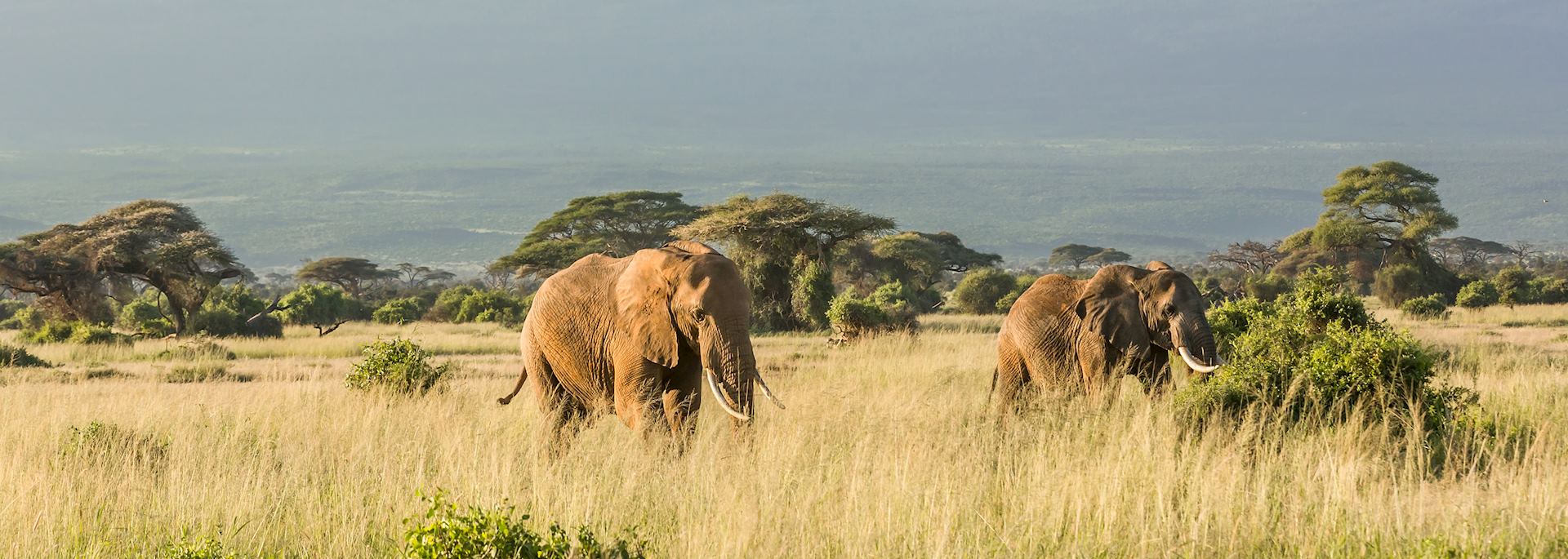
Tailor-made Tanzania holidays shaped around your passions
Witnessing the Great Migration in the Serengeti, summiting Mount Kilimanjaro , relaxing on Zanzibar’s soft-sand beaches… On a tailor-made holiday to Tanzania with Audley, you’ll see the highlights — and much more — your way. We’ll design your ideal holiday with you, paying close attention to your interests, your travel style and your budget. Our Tanzania safari specialists know the country inside out and can lead you to experiences you won’t find in a guidebook.
Watching herds of wildebeest frantically cross the Mara River, dodging the snapping jaws of crocodiles. Listening to bird calls on walking safaris through remote areas of the Serengeti. Tracking the Big Five on game drives in the Ngorongoro Crater. Spotting hippo, sable antelope and rainbow-plumed birds on boat safaris in Nyerere National Park . Trekking for chimpanzee troops in the forests of Mahale Mountains National Park.
The elephant-dotted plains of Tarangire National Park . The sandy shores and sparkling water of Lake Tanganyika. Roaring lion prides prowling Ruaha National Park… What excites you? Travel at your own pace, in your own style, with the confidence that we’ll show you the best options, wherever you go.
- Make an enquiry
- Request a brochure
Suggested tours for Tanzania
Conquer the climb to Mount Kilimanjaro's summit, or search of the elusive Big Five in the Nyerere National Park. We'll use our first-hand expert knowledge to shape your trip around your travel style, interests, and budget. We can also combine your Tanzania tour with some time to relax on the sandy beaches of Zanzibar.

Classic Tanzania: safari & beach
12 days from £5,080pp
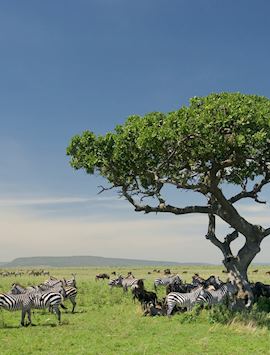
Classic northern Tanzania safari
9 days from £5,990pp
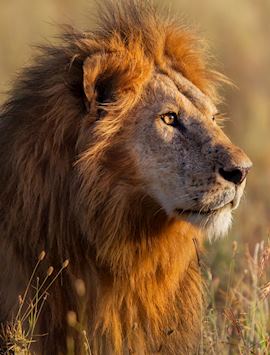
Luxury northern Tanzania safari
13 days from £14,950pp
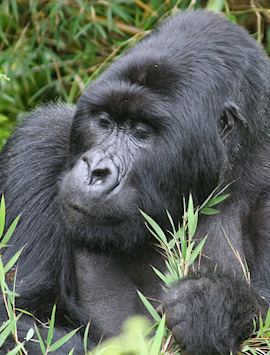
Gorillas, the Great Migration & the Big Five
12 days from £9,750pp
Suggested activities for Tanzania
Watch the magical break of dawn in the Serengeti with an unforgettable balloon safari or take a walk with the Hadzabe Tribe to learn about their way of life. We’ve delved deep on our travels to find the most authentic experiences that are designed to enhance your trip to Tanzania.
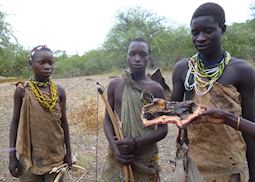
Go Walking with the Hunter-gatherer Hadzabe Tribe
Trekking with this tribe is one of the most fascinating experiences you can do anywhere in East Africa. Walks vary between 5-8 km and at times they walk fairly quickly.
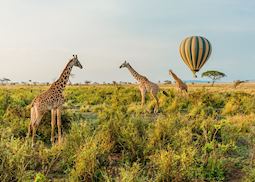
Serengeti Balloon Safari
This is one of the most popular ways to see the wildlife of the Serengeti. The flight will last for around an hour before you land to celebrate with champagne before a full English breakfast prepared and served in style in the middle of the bush.
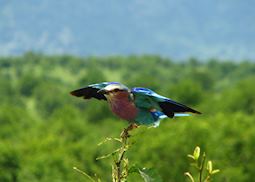
Walking Safari in Ruaha National Park
The emphasis on your safari with your host and guide, Moli, is on the walking safaris which really unveil the magic of Ruaha National Park. You can also incorporate bushcraft into a walk.
More choice for your safari
- Inspiration across all our African destinations
- Trip suggestions based on your interests
- Advice on where to safari, when
- Meet our team of safari experts
Best time to visit
Our specialists advise on the best months to visit Tanzania, including information about climate, events and festivals.
Request our brochure
Covering all seven continents, The World Your Way shows you how you can see the world with us. It features trip ideas from our specialists alongside hand-picked stays and experiences, and introduces our approach to creating meaningful travel experiences.
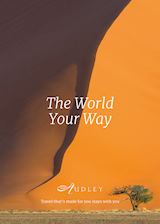
Useful information for planning your holiday in Tanzania
The official languages of Tanzania are Kiswahili and English. More than 100 different languages are spoken across the country, but almost everybody at popular visitor destinations will be able to speak some English.
The currency of Tanzania is the Tanzania shilling (TSh or TZS). Most banks in major cities have ATMs, but they aren’t always reliable. Credit cards are accepted at some major hotels, but a surcharge will usually be added. We recommend that you don't rely on credit cards other than as a backup.
Hotels, and some restaurants and shops in popular visitor areas will also accept payment in US dollars, but due to a spate of forgeries, nobody in Tanzania, including banks, will accept US$100 notes, so it’s best to carry smaller denominations.
In Tanzania you should try kichumbari (tomato, cucumber, and bell pepper salad), mchicha (green vegetable stew), and chapati (thick naan-like bread). In Zanzibar you’ll find dishes based on seafood cooked in coconut milk, while milky Zanzibar spiced tea is popular to drink. The food on the coast is heavily influenced by Indian and Arabic cuisine, but in camps, hotels, and lodges you’ll find more international dishes.
For the latest travel advice for Tanzania, including entry requirements, health information, and the safety and security situation, please refer to the Foreign, Commonwealth & Development Office website .
In Tanzania you could track the Big Five or see the Great Migration, summit Mount Kilimanjaro, relax on white-sand beaches, and snorkel on coral reefs teeming with tropical fish.
An incredibly diverse destination, Tanzania’s wildlife is a major draw and for many visitors, the highlight is witnessing the Great Migration of two million wildebeest, zebra, and gazelles across the Serengeti . For others, it’s tracking the Big Five in the Ngorongoro Crater , taking a hot air balloon flight over herds of elephant or giraffe, or tracking chimpanzees . Or you may want to slow down on a boating safari in Nyerere National Park or a walking safari in Ruaha National Park and get closer to smaller species.
Alternatively, you could take on the challenge of hiking up Mount Kilimanjaro on a multi-day trek, see turtles off the coast, visit traditional villages, or simply laze on powder-soft sands and swim in turquoise seas.
In Tanzania you can stay in rustic safari camps, luxurious lodges, on private islands, and in ocean-front resorts with extensive facilities. While on safari, you’ll have the choice of opting for simple tented camps where you’ll wake to the sound of wildlife at a nearby watering hole, or stylishly intimate lodges hidden deep in the forest.
Elsewhere, you could stay at a luxurious coastal resort with lots of activities, choose private villas, simple cottages, or even an underwater room. If it’s local history and character you’re after, you can stay in a former sultan’s palace in Zanzibar’s Stone Town. For some ideas, browse our collection of places to stay in Tanzania .
You could visit Serengeti National Park, Ngorongoro Crater, Mount Kilimanjaro, and Zanzibar on a trip to Tanzania, among many other wildlife areas. Most visitors choose to visit national parks that link together geographically to make the most of their time, and then follow the adventure of a safari with time relaxing on the white sands of Tanzania’s coast or islands.
Tanzania’s safari areas can be divided into the northern, southern, and western circuits. In the north are Serengeti National Park , the Ngorongoro Crater , and Tarangire and Lake Manyara national parks. In the south, you could visit Nyerere National Park and Ruaha National Park , while to the west Katavi and Mahale Mountains national parks combine well. If you’re up for a challenge, you could tag on a climb up Mount Kilimanjaro before unwinding on the palm-fringed beaches in Zanzibar .
A safari in Tanzania is a great way to see the Big Five — lion, elephant, buffalo, leopard, and the black rhino — but you’ll also see giraffe, zebra, and occasionally cheetah, among many other species. Two million wildebeest, zebra, and gazelle cross the Serengeti during the Great Migration and in their wake a slew of predators such as lion, leopard, cheetah, hyena, and crocodiles follow.
A boat safari in Nyerere National Park promises sightings of hippo, sable antelope, and vibrant birdlife, while hiking in Mahale Mountains National Park, brings the prospect of spotting chimpanzees sweeping through the trees.
It takes around 12 hours to fly from the UK to Tanzania.
The time zone in Tanzania is UTC+3 hours. Daylight Savings Time is not observed here.
The best way to get around Tanzania is by road or by air. You could travel around Tanzania with a private driver-guide learning about the country and its wildlife as you journey between destinations or combine road travel with some internal flights to see the diversity of Tanzania’s landscapes in a fast, efficient way.
The best time to see the Great Migration is from June to October when the herds are crossing back and forth between the northern Serengeti and the Masai Mara. It’s the best time of year to see dramatic river crossings but is also the busiest time of year. November to March, Tanzania’s ‘green season’ is far quieter, and from January you’ll see the herds grazing with newly born calves. The long rains between April and May make this the only time of year less suited to seeing the huge herds of wildlife on the move.
British citizens of all ages need a visa for travel to Tanzania. You can get a visa on arrival at major airports, or you can apply in advance on the Electronic Visa Application System .
Your doctor can provide you with vaccine advice for Tanzania, but you should also ensure you’re up to date with the recommended vaccinations for your home country. You can also check the suggested vaccinations on the Travel Health Pro website .
If you’re coming from or transiting through a country affected by yellow fever, the government of Tanzania may request proof of vaccination against the disease. Check the list of countries at risk of yellow fever and speak to your doctor as vaccination is not advised for everyone.
There’s a high risk of malaria in all areas of Tanzania below 1,800 m (5,906 ft). There’s also a risk of malaria in Zanzibar. See your doctor to discuss which antimalarials will suit you best.
To lower your risk, avoid being bitten by mosquitoes by wearing long, loose clothing, wearing repellent, and using mosquito nets where provided.
Passports must have two blank pages and be valid for six months beyond the date of your return from Tanzania.
Tanzania in pictures
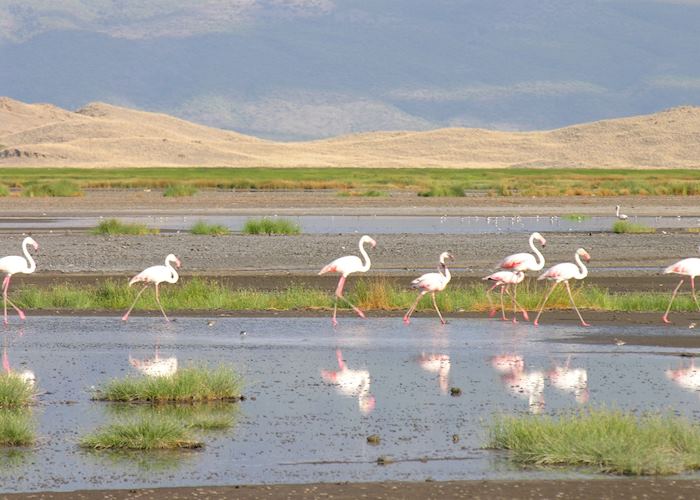
Our expert guides to travelling in Tanzania
Written by our specialists from the viewpoint of their own travels, these guides will help you decide on the shape of your own trip to Tanzania. Aiming to inspire and inform, we share our recommendations for how to appreciate Tanzania at its best.

My travels in Tanzania
In his footage taken on safari in Selous Game Reserve, our Tanzania specialist Mark highlights its wildlife and landscapes. Mark captures one of Africa’s great wildernesses, and the stomping ground for giraffe, lion, wild dog, water buffalo and elephant.
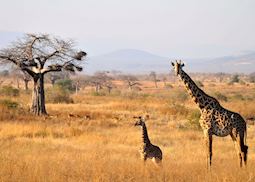
Family safaris in Tanzania
Whether you’re looking for The Lion King experience on the Serengeti or a truly wild adventure in the south, Tanzania is a great place for a family safari. Specialist Philippa suggests some child-friendly camps and lodges and offers insider tips on planning.
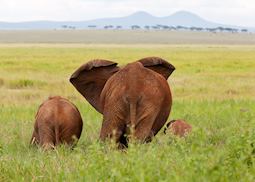
Tanzania safaris: north vs south
With the Great Migration taking place in the north and true wilderness areas stuffed full of animals in the south, you’re spoiled for choice when choosing a safari in Tanzania. Using his first-hand experience, Tanzania specialist Dickie shares his ideas for a memorable safari holiday.
10 min read
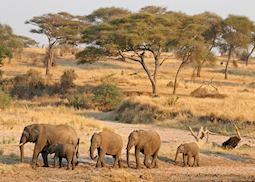
Honeymoons in Tanzania
Tanzania offers a variety of private, secluded experiences, which make it a stand-out honeymoon destination. Country specialist, Georgia, explains how you can combine time on safari with relaxation on a palm fringed beach in Zanzibar.
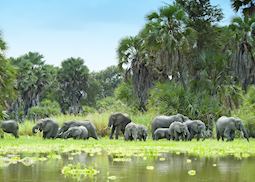
What to do in Tanzania: our highlights guide
The Great Migration of wildebeest and zebra through the Serengeti is not the only highlight of Tanzania. We have come up with five of our favourites, from climbing Kilimanjaro to relaxing on the beautiful island of Zanzibar.
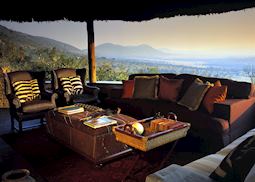
Luxury safari holidays in Tanzania
Tanzania is home to some of the most luxurious safari lodges in Africa. It is also home of the world-famous Great Migration, so if you are looking to view this spectacle in style, our country specialists can help you plan your perfect trip to Tanzania.
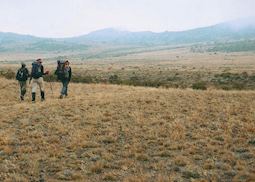
Trekking holidays in Tanzania
Africa's largest peak, Mount Kilimanjaro, is found in Tanzania and a trek to the summit can be included a tailor-made holiday with us. If you're an avid trekker, you might also like to consider exploring Mahale Mountains National Park.
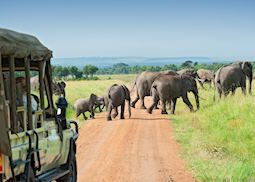
Africa’s best safari areas
You’re spoiled for choice when it comes to picking an Africa safari destination, but where do you begin? Our safari specialists round up their best six wildlife areas on the continent to help you decide where to plan your next safari.
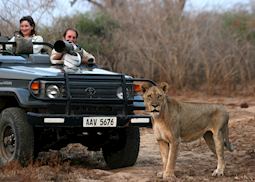
A typical day on an African safari
A typical day on safari essentially revolves around the need to see the wildlife at its most active. It usually follows a similar routine with slight variations between destinations and seasons.
Discover more about Tanzania on our blog
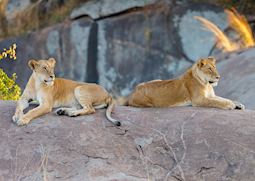
A day in the life of a Serengeti safari guide
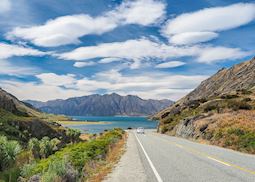
4 travel trends for 2023
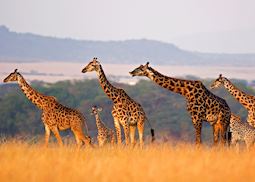
What it is like to travel in 2022: five tips from our specialists
Other popular destinations.
Still looking for ideas? If Tanzania has captured your interest, we think you might also like these destinations.

South Africa
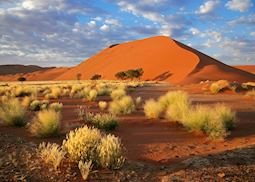
Security Alert May 17, 2024
Worldwide caution, update may 10, 2024, information for u.s. citizens in the middle east.
- Travel Advisories |
- Contact Us |
- MyTravelGov |
Find U.S. Embassies & Consulates
Travel.state.gov, congressional liaison, special issuance agency, u.s. passports, international travel, intercountry adoption, international parental child abduction, records and authentications, popular links, travel advisories, mytravelgov, stay connected, legal resources, legal information, info for u.s. law enforcement, replace or certify documents.
Before You Go
Learn About Your Destination
While Abroad
Emergencies
Share this page:
Travel Advisory July 31, 2023
Tanzania - level 2: exercise increased caution.
Reissued with obsolete COVID-19 page links removed.
Exercise increased caution in Tanzania due to crime, terrorism, and targeting of LGBTI persons . Some areas have increased risk. Read the entire Travel Advisory.
Reconsider Travel To:
- Mtwara Region in southern Tanzania due to the threat of terrorism.
Country Summary : Violent crime, such as assault, sexual assault, robberies, mugging, and carjacking, is common. Local police may lack the resources to respond effectively to serious crime.
Terrorist groups could attack in Tanzania with little or no warning, targeting embassies, police stations, mosques, and other places frequented by Westerners. Please see the additional information below regarding the increased threat of terrorism in Mtwara Region.
Members of the LGBTI community have been arrested, targeted, harassed, and/or charged with unrelated offenses. Individuals detained under suspicion of same-sex sexual conduct could be subject to forced anal examinations.
Read the country information page for additional information on travel to Tanzania.
If you decide to travel to Tanzania:
- Always carry a copy of your U.S. passport and visa and keep original documents in a secure location.
- Be aware of your surroundings.
- Do not leave your food or drink unattended.
- Stay alert in all locations, especially those frequented by Westerners.
- Avoid public displays of affection particularly between same-sex couples.
- Enroll in the Smart Traveler Enrollment Program (STEP) to receive Alerts and make it easier to locate you in an emergency.
- Follow the Department of State on Facebook and Twitter.
- Review the Country Security Report for Tanzania.
- Prepare a contingency plan for emergency situations. Review the Traveler’s Checklist .
- Visit the CDC page for the latest Travel Health Information related to your travel.
Mtwara Region in southern Tanzania – Level 3: Reconsider Travel There have been reports of violence in Mtwara Region in southern Tanzania. Increased activity by extremists along the southern border has led to attacks against both government and civilian targets.
Embassy Messages
View Alerts and Messages Archive
Quick Facts
6 months. Passports with the “X” gender marker are not accepted.
Yellow fever required if traveling from a country where the disease is endemic.
Travelers must declare international currency valuing more than $10,000 on both entrance to and exit from Tanzania. Non-resident American citizens may not import or export Tanzanian Shillings (TSH).
Non-residents (except Kenyans and Ugandans) may not import or export Tanzanian Shillings (TZS)
Embassies and Consulates
U.s. embassy dar es salaam.
686 Old Bagamoyo Road, Msasani, Dar es Salaam, Tanzania Telephone: +(255) 22-229-4000 Emergency After-Hours Telephone: +(255) 22-229-4000, dial '1' for an emergency operator Email: [email protected]
Destination Description
The United Republic of Tanzania is a constitutional republic located in East Africa. It enjoys a relatively stable economy; it is resource-rich and has a growing tourist industry. Tourist facilities are centered around the “northern and southern circuit” of National Parks which include the Serengeti, Ngorongoro Crater, Kilimanjaro, Arusha, Nyerere, and Ruaha as well as the islands in the semi-autonomous Zanzibar archipelago.
See the Department of State’s Fact Sheet on Tanzania for information on U.S.-Tanzania relations.
Entry, Exit and Visa Requirements
Visas: Tourists must obtain a one-year multiple entry visa for $100. Applicants can apply and pay online for an e-visa in advance of travel. If approved, the applicant will receive a “grant notice” via email which they present to the Immigration Officer upon arrival at the airport in Tanzania. U.S. citizens can also obtain a tourist visa upon arrival.
Volunteer work is prohibited on a tourist visa. Volunteers must obtain a Class “C” Residence Permit .
Contact the Tanzanian Immigration Services Department for information on obtaining a residence permit .
Obtain the latest information on visas from the Embassy of Tanzania in Washington D.C.
Information about dual nationality or the prevention of international child abduction can be found on our website. For further information about customs regulations, please read our Customs Information page . Please note that Tanzania does not permit dual citizenship for adults.
Entry Requirements:
- Passport with at least one blank page and six months’ validity.
- Visitors must present a round-trip ticket and be prepared to demonstrate they have sufficient funds for their stay.
- Proof of yellow fever vaccination is required for all travelers arriving from countries where the disease is endemic, including 12+ hour airport transit and layovers. The Embassy of Tanzania has further information, including on waivers for this requirement.
Information about recommended vaccinations and medications can be found on the CDC’s website .
HIV/AIDS restrictions: The U.S. Department of State is unaware of any HIV/AIDS entry restrictions for visitors to, or foreign residents of, Tanzania.
Safety and Security
You should review the Department of State’s Travel Advisory for Tanzania before considering travel to Tanzania.
Terrorism: Travelers should be aware that terrorists are increasingly using less sophisticated methods of attack – including knives, firearms, and vehicles – to more effectively target crowds. Frequently, their aim is unprotected or vulnerable targets, such as:
- High-profile public events (sporting contests, political rallies, demonstrations, holiday events, celebratory gatherings, etc.)
- Hotels, clubs, and restaurants frequented by tourists
- Places of worship
- Schools
- Parks
- Shopping malls and markets
- Public transportation systems (including subways, buses, trains, and scheduled commercial flights)
There have been reports of violence in the Mtwara region in southern Tanzania. Increased activity by extremists along the southern border has led to attacks against both government and civilian targets.
For more information, see our Terrorism page.
Crime: Crime in Tanzania is a regular occurrence and Tanzanian authorities have limited capacity to deter and investigate such acts.
- Home invasions, sometimes violent, have been reported in Arusha and Dar es Salaam.
- Pickpockets and bag snatchers target Westerners in tourist areas.
International Financial Scams: See the Department of State and the FBI pages for information on scams.
Victims of Crime: If you or someone you know becomes the victim of a crime abroad, you should contact the local police and the U.S. embassy.
- Replace a stolen passport.
- Help you find appropriate medical care if you are the victim of violent crimes such as assault or rape.
- Put you in contact with the appropriate police authorities, and if you want us to, contact family members or friends.
- Direct you to local attorneys, although it is important to remember that local authorities are responsible for investigating and prosecuting the crime.
Domestic Violence: U.S. citizen victims of domestic violence may have difficulty accessing sufficient social and/or medical support and local police have limited resources. The Embassy can provide information on the limited resources available in Tanzania to support survivors of domestic violence.
Sexual Assault: is a risk for all U.S. citizens and especially for women travelers.
- Victims of sexual assault may have difficulty accessing sufficient social and/or medical support.
- Local police have limited resources and investigations are often not completed. Prosecutions are very rare.
The local equivalent to the “911” emergency line in Tanzania is “111”, “112”, and “+255 787 668 306” however response times can be very slow and service unreliable.
Please see our information for victims of crime , including possible victim compensation programs in the United States.
Local Laws & Special Circumstances
Criminal Penalties: While you are traveling in Tanzania, you are subject to its laws. Foreign laws and legal systems can be vastly different from our own. Persons violating Tanzania’s laws, even unknowingly, may be expelled, arrested, or imprisoned.
- Penalties for possessing, using, or trafficking in illegal drugs in Tanzania are severe, and convicted offenders can expect long jail sentences and heavy fines.
- Photographing military installations is forbidden. Individuals have been detained and/or had their cameras confiscated for taking photos of hospitals, schools, bridges, industrial sites and airports. Sites where photography is prohibited are not always marked.
- It is illegal to import or export an animal or animal part without export certification from the Tanzanian government.
- It is illegal to gather, collect, or remove flora or fauna, including seashells, ebony or mpingo wood.
Furthermore, certain acts of U.S. citizens overseas are prosecutable as crimes in the United States even if they are not illegal under the local law. For examples, see our website on crimes against minors abroad .
Arrest Notification: If you are arrested or detained, ask police or prison officials to notify the U.S. Embassy immediately. See our webpage for further information.
What to Wear: While visiting Tanzania, you should dress modestly outside of the hotel or resort. Entering public areas in a bathing suit or in clothes that would be deemed immodest according to the local community may attract negative public attention.
Ramadan: During the holy month of Ramadan, when Muslims fast during daylight hours, U.S. citizens should be mindful and respectful of local culture and religious views.
Faith-Based Travelers: See our following webpages for details:
- Faith-Based Travel Information
- International Religious Freedom Report – see country reports
- Human Rights Report – see country reports
- Hajj Fact Sheet for Travelers
- Best Practices for Volunteering Abroad
LGBTQI+ Travelers: Consensual same-sex sexual relations are a criminal offense in Tanzania. Those convicted may be sentenced to up to 30 years in prison. Authorities use the penal code to intimidate and arrest individuals based on their real or perceived sexual orientation or gender identity. Individuals detained under suspicion of same-sex sexual conduct may be subject to or threatened with forced anal examinations.
Members of the LGBTQI+ community may be denied entry to Tanzania by immigration authorities (including on Zanzibar) or once admitted may be targeted, harassed, and/or charged with unrelated offenses.
Public displays of affection between persons of the same sex may be met with harassment or violence. Non-governmental organizations that support the LGBTQI+ community and their staff may also be targeted, harassed, or have staff members detained by local authorities.
For more detailed information about respect for the human rights of LGBTQI+ persons in Tanzania, you may review the State Department’s annual Country Reports on Human Rights Practices . For further information specific to LGBTQI+ travel, please read our LGBTQI+ Travel Information page .
The Tanzanian government does not accept passports with the “X” gender marker. This applies to travel to, within, or through Tanzania.
Accessibility: Individuals may find accessible accommodation challenging to find in Tanzania. Sidewalks are nearly non-existent and there are frequent power outages.
Medical Emergencies, Ambulance Services:
- Are unreliable and/or not easily accessible throughout the country. Travelers may prefer to take a taxi or private vehicle to the nearest major hospital.
- Not equipped with state-of-the-art medical equipment.
- Click here to access the list of medical facilities in Tanzania from the Embassy website.
The Department of State, U.S. embassies and U.S. consulates do not pay medical bills. Be aware that U.S. Medicare/Medicaid does not apply overseas. Most hospitals and doctors overseas do not accept U.S. health insurance.
Medical Insurance: Make sure your health insurance plan provides coverage overseas, including in Tanzania. Most care providers overseas only accept cash payments. See our webpage for more information on insurance providers for overseas coverage . We strongly recommend supplemental insurance to cover medical evacuation. Visit the U.S. Centers for Disease Control and Prevention for more information on type of insurance you should consider before you travel overseas.
Prescription Medication: Always carry your prescription medication in original packaging with your doctor’s prescription. Check with the Embassy of Tanzania in Washington D.C. to ensure the medication is legal in Tanzania.
You can find detailed information on vaccinations and other health precautions on the CDC website . For information about outbreaks of infectious diseases abroad, consult the World Health Organization (WHO) website , which contains additional health information for travelers, including detailed country-specific health information .
Water Quality & Food Safety
- In many areas, tap water is not potable. Bottled water and beverages are generally safe, although you should be aware that many restaurants and hotels serve tap water unless bottled water is specifically requested. Be aware that ice for drinks may be made using tap water.
- If ascending Mount Kilimanjaro or other mountains in Tanzania, be aware of the symptoms of altitude sickness, and take precautions before you travel.
- Visit the U.S. Centers for Disease Control and Prevention website for more information about Travel to High Altitudes.
Adventure Travel
Visit the U.S. Centers for Disease Control and Prevention website for more information about Adventure Travel.
Travel and Transportation
TRAFFIC SAFETY AND ROAD CONDITIONS: While in Tanzania, you may encounter dangerous road conditions. Road accidents are a major threat to travelers in Tanzania. Roads are poorly maintained and often bumpy, potholed, and unpaved. Even good roads may deteriorate quickly due to weather conditions. Travelers should note that traffic moves on the left side of the road, which can be very disorienting to those not accustomed to it.
- Beware of vehicles traveling at excessive speed, and unpredictable local driving habits.
- Many vehicles are poorly maintained and lack basic safety equipment.
- Heavy traffic jams, either due to rush hour or because of accidents, are common.
- Vehicles may cross the median strip and drive against the flow of traffic.
- During the rainy season ((late March to mid-June and mid-November to mid-December), many roads in Tanzania, both urban and rural, are passable only with four-wheel-drive vehicles.
- Please refer to our Road Safety page for more information.
Traffic Laws: Tanzanian law requires all motor vehicle operators to be in possession of a valid driver’s license. Persons staying in Tanzania for fewer than six months may use a valid U.S. driver’s license after validation by local traffic authorities, or an international driver’s license. Persons intending to remain in Tanzania for more than six months are required to obtain a Tanzanian driver’s license. All vehicles are required to carry third-party liability insurance and to post the decal in the front window.
Public Transport:
- Use taxis or hire a driver from a reputable source.
- Travelers should avoid using public buses known as “dala-dalas”; three-wheeled taxis known as “bajajis”; and motorcycle taxis called “boda-bodas”. These modes of transport are often poorly maintained and ignore traffic rules.
- When traveling to Zanzibar by ferry, use the high-speed ferry and purchase your tickets from inside the ferry terminal or online in advance. Tickets should include your name, date of travel, and class of travel.
Aviation Safety Oversight: As there is no direct commercial air service to the United States by carriers registered in Tanzania, the U.S. Federal Aviation Administration (FAA) has not assessed the government of Tanzania's Civil Aviation Authority for compliance with International Civil Aviation Organization (ICAO) aviation safety standards. Further information may be found on the FAA's safety assessment page .
Maritime Travel: Mariners planning travel to Tanzania should also check for U.S. maritime advisories and alerts . Information may also be posted to the U.S. Coast Guard homeport website and the NGA broadcast warnings website .
For additional travel information
- Enroll in the Smart Traveler Enrollment Program (STEP) to receive security messages and make it easier to locate you in an emergency.
- Call us in Washington, D.C. at 1-888-407-4747 (toll-free in the United States and Canada) or 1-202-501-4444 (from all other countries) from 8:00 a.m. to 8:00 p.m., Eastern Standard Time, Monday through Friday (except U.S. federal holidays).
- See the State Department’s travel website for the Worldwide Caution and Travel Advisories .
- Follow us on Twitter and Facebook .
- See traveling safely abroad for useful travel tips.
Review information about International Parental Child Abduction in Tanzania . For additional IPCA-related information, please see the International Child Abduction Prevention and Return Act ( ICAPRA ) report.
Adoption Notices
Travel advisory levels, assistance for u.s. citizens, tanzania map, learn about your destination, enroll in step.

Subscribe to get up-to-date safety and security information and help us reach you in an emergency abroad.
Recommended Web Browsers: Microsoft Edge or Google Chrome.
Make two copies of all of your travel documents in case of emergency, and leave one with a trusted friend or relative.
Afghanistan
Antigua and Barbuda
Bonaire, Sint Eustatius, and Saba
Bosnia and Herzegovina
British Virgin Islands
Burkina Faso
Burma (Myanmar)
Cayman Islands
Central African Republic
Cote d Ivoire
Curaçao
Czech Republic
Democratic Republic of the Congo
Dominican Republic
El Salvador
Equatorial Guinea
Eswatini (Swaziland)
Falkland Islands
France (includes Monaco)
French Guiana
French Polynesia
French West Indies
Guadeloupe, Martinique, Saint Martin, and Saint Barthélemy (French West Indies)
Guinea-Bissau
Isle of Man
Israel, The West Bank and Gaza
Liechtenstein
Marshall Islands
Netherlands
New Caledonia
New Zealand
North Korea (Democratic People's Republic of Korea)
Papua New Guinea
Philippines
Republic of North Macedonia
Republic of the Congo
Saint Kitts and Nevis
Saint Lucia
Saint Vincent and the Grenadines
Sao Tome and Principe
Saudi Arabia
Sierra Leone
Sint Maarten
Solomon Islands
South Africa
South Korea
South Sudan
Switzerland
The Bahamas
Timor-Leste
Trinidad and Tobago
Turkmenistan
Turks and Caicos Islands
United Arab Emirates
United Kingdom
Vatican City (Holy See)
External Link
You are about to leave travel.state.gov for an external website that is not maintained by the U.S. Department of State.
Links to external websites are provided as a convenience and should not be construed as an endorsement by the U.S. Department of State of the views or products contained therein. If you wish to remain on travel.state.gov, click the "cancel" message.
You are about to visit:
You are using an outdated browser. Upgrade your browser today or install Google Chrome Frame to better experience this site.
Tanzania, including Zanzibar Traveler View
Travel health notices, vaccines and medicines, non-vaccine-preventable diseases, stay healthy and safe.
- Packing List
After Your Trip
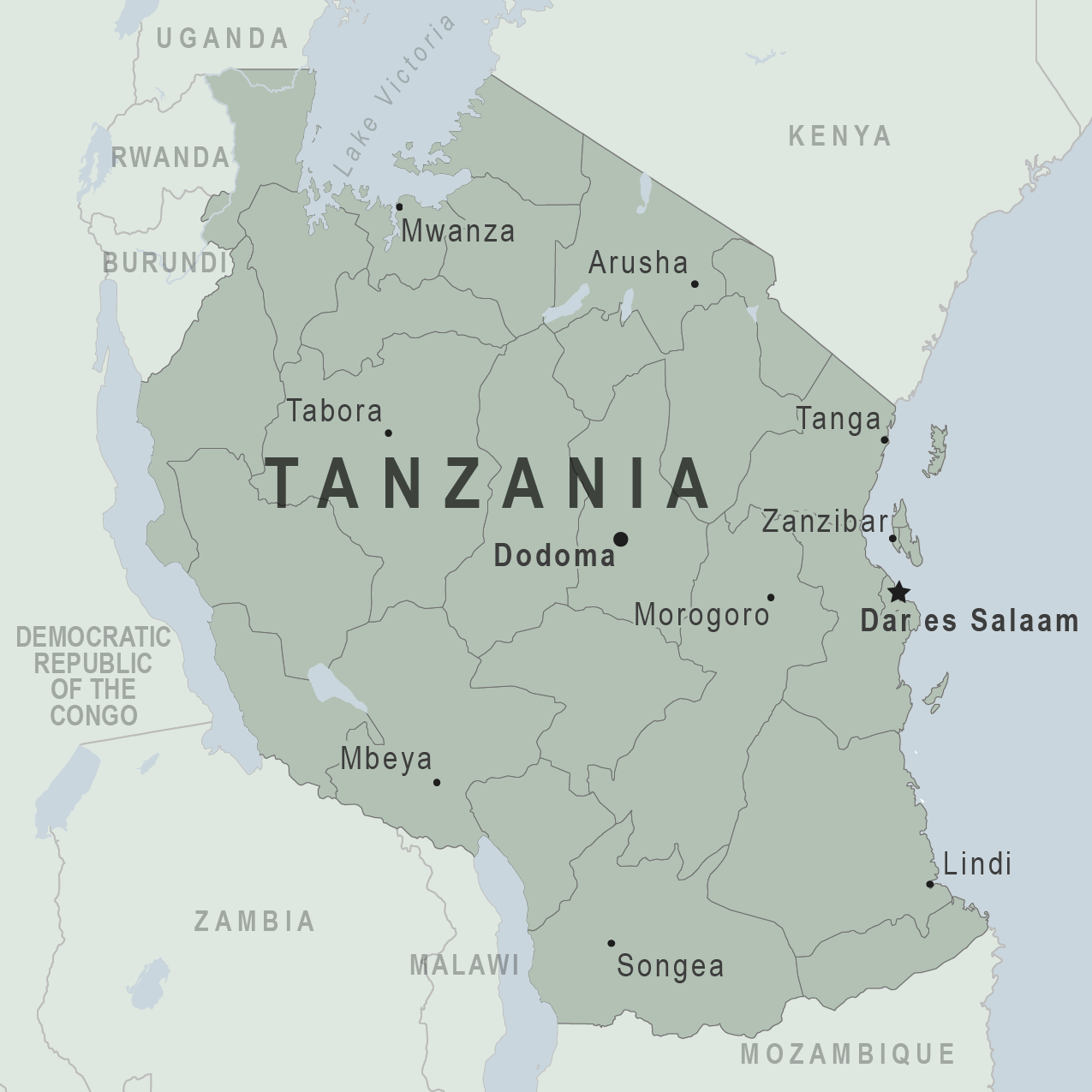
Be aware of current health issues in Tanzania. Learn how to protect yourself.
Level 2 Practice Enhanced Precautions
- Global Polio May 23, 2024 Some international destinations have circulating poliovirus. Before any international travel, make sure you are up to date on your polio vaccines. Destination List: Afghanistan, Algeria, Angola, Benin, Botswana, Burkina Faso, Burundi, Cameroon, Central African Republic, Chad, Côte d'Ivoire (Ivory Coast), Democratic Republic of the Congo, Egypt, Guinea, Indonesia, Kenya, Liberia, Madagascar, Malawi, Mali, Mauritania, Mozambique, Niger, Nigeria, Pakistan, Republic of the Congo, Senegal, Sierra Leone, Somalia, Sudan, Tanzania, including Zanzibar, Yemen, Zambia, Zimbabwe
⇧ Top
Check the vaccines and medicines list and visit your doctor at least a month before your trip to get vaccines or medicines you may need. If you or your doctor need help finding a location that provides certain vaccines or medicines, visit the Find a Clinic page.
Routine vaccines
Recommendations.
Make sure you are up-to-date on all routine vaccines before every trip. Some of these vaccines include
- Chickenpox (Varicella)
- Diphtheria-Tetanus-Pertussis
- Flu (influenza)
- Measles-Mumps-Rubella (MMR)
Immunization schedules
All eligible travelers should be up to date with their COVID-19 vaccines. Please see Your COVID-19 Vaccination for more information.
COVID-19 vaccine
Active cholera transmission is widespread in Tanzania. Cholera is rare in travelers. Certain factors may increase the risk of getting cholera or having severe disease ( more information ). Avoiding unsafe food and water and washing your hands can also help prevent cholera.
Vaccination may be considered for children and adults who are traveling to areas of active cholera transmission.
Cholera - CDC Yellow Book
Hepatitis A
Recommended for unvaccinated travelers one year old or older going to Tanzania.
Infants 6 to 11 months old should also be vaccinated against Hepatitis A. The dose does not count toward the routine 2-dose series.
Travelers allergic to a vaccine component or who are younger than 6 months should receive a single dose of immune globulin, which provides effective protection for up to 2 months depending on dosage given.
Unvaccinated travelers who are over 40 years old, immunocompromised, or have chronic medical conditions planning to depart to a risk area in less than 2 weeks should get the initial dose of vaccine and at the same appointment receive immune globulin.
Hepatitis A - CDC Yellow Book
Dosing info - Hep A
Hepatitis B
Recommended for unvaccinated travelers younger than 60 years old traveling to Tanzania. Unvaccinated travelers 60 years and older may get vaccinated before traveling to Tanzania.
Hepatitis B - CDC Yellow Book
Dosing info - Hep B
CDC recommends that travelers going to certain areas of Tanzania take prescription medicine to prevent malaria. Depending on the medicine you take, you will need to start taking this medicine multiple days before your trip, as well as during and after your trip. Talk to your doctor about which malaria medication you should take.
Find country-specific information about malaria.
Malaria - CDC Yellow Book
Considerations when choosing a drug for malaria prophylaxis (CDC Yellow Book)
Malaria information for Tanzania.
Cases of measles are on the rise worldwide. Travelers are at risk of measles if they have not been fully vaccinated at least two weeks prior to departure, or have not had measles in the past, and travel internationally to areas where measles is spreading.
All international travelers should be fully vaccinated against measles with the measles-mumps-rubella (MMR) vaccine, including an early dose for infants 6–11 months, according to CDC’s measles vaccination recommendations for international travel .
Measles (Rubeola) - CDC Yellow Book
In Tanzania poliovirus has been identified in the past year.
Travelers to Tanzania are at increased risk of exposure to poliovirus.
Vaccine recommendations : Adults traveling to Tanzania who received a complete polio vaccination series as children may receive a single lifetime booster dose of inactivated polio vaccine; travelers who are unvaccinated or not fully vaccinated should receive a complete polio vaccination series before travel. Children who are not fully vaccinated will be considered for an accelerated vaccination schedule .
Polio - CDC Yellow Book
Polio: For Travelers
Dogs infected with rabies are commonly found in Tanzania.
Rabies is also present in some terrestrial wildlife species.
If rabies exposures occur while in Tanzania, rabies vaccines may only be available in larger suburban/urban medical facilities.
Rabies pre-exposure vaccination considerations include whether travelers 1) will be performing occupational or recreational activities that increase risk for exposure to potentially rabid animals and 2) might have difficulty getting prompt access to safe post-exposure prophylaxis.
Please consult with a healthcare provider to determine whether you should receive pre-exposure vaccination before travel.
For more information, see country rabies status assessments .
Rabies - CDC Yellow Book
Recommended for most travelers, especially those staying with friends or relatives or visiting smaller cities or rural areas.
Typhoid - CDC Yellow Book
Dosing info - Typhoid
Yellow Fever
Required for travelers ≥1 year old arriving from countries with risk for YF virus transmission; this includes >12-hour airport transits or layovers in countries with risk for YF virus transmission. 1
Generally not recommended for travel to Tanzania.
Yellow Fever - CDC Yellow Book
- Avoid contaminated water
Leptospirosis
How most people get sick (most common modes of transmission)
- Touching urine or other body fluids from an animal infected with leptospirosis
- Swimming or wading in urine-contaminated fresh water, or contact with urine-contaminated mud
- Drinking water or eating food contaminated with animal urine
- Avoid contaminated water and soil
- Avoid floodwater
Clinical Guidance
Schistosomiasis
- Wading, swimming, bathing, or washing in contaminated freshwater streams, rivers, ponds, lakes, or untreated pools.
Avoid bug bites
African sleeping sickness (african trypanosomiasis).
- Tsetse fly bite
- Avoid Bug Bites
African Trypanosomiasis
African Tick-Bite Fever
African Tick-bite fever
Chikungunya
- Mosquito bite
Crimean-Congo Hemorrhagic fever
- Tick bite
- Touching the body fluids of a person or animal infected with CCHF
- Mosquito bite
- Avoid animals
Rift Valley Fever
- Touching blood, body fluids, or tissue of infected livestock
Rift Valley fever
Airborne & droplet
- Breathing in air or accidentally eating food contaminated with the urine, droppings, or saliva of infected rodents
- Bite from an infected rodent
- Less commonly, being around someone sick with hantavirus (only occurs with Andes virus)
- Avoid rodents and areas where they live
- Avoid sick people
Tuberculosis (TB)
- Breathe in TB bacteria that is in the air from an infected and contagious person coughing, speaking, or singing.
Learn actions you can take to stay healthy and safe on your trip. Vaccines cannot protect you from many diseases in Tanzania, so your behaviors are important.
Eat and drink safely
Food and water standards around the world vary based on the destination. Standards may also differ within a country and risk may change depending on activity type (e.g., hiking versus business trip). You can learn more about safe food and drink choices when traveling by accessing the resources below.
- Choose Safe Food and Drinks When Traveling
- Water Treatment Options When Hiking, Camping or Traveling
- Global Water, Sanitation and Hygiene (WASH)
- Avoid Contaminated Water During Travel
You can also visit the Department of State Country Information Pages for additional information about food and water safety.
Prevent bug bites
Bugs (like mosquitoes, ticks, and fleas) can spread a number of diseases in Tanzania. Many of these diseases cannot be prevented with a vaccine or medicine. You can reduce your risk by taking steps to prevent bug bites.
What can I do to prevent bug bites?
- Cover exposed skin by wearing long-sleeved shirts, long pants, and hats.
- Use an appropriate insect repellent (see below).
- Use permethrin-treated clothing and gear (such as boots, pants, socks, and tents). Do not use permethrin directly on skin.
- Stay and sleep in air-conditioned or screened rooms.
- Use a bed net if the area where you are sleeping is exposed to the outdoors.
What type of insect repellent should I use?
- FOR PROTECTION AGAINST TICKS AND MOSQUITOES: Use a repellent that contains 20% or more DEET for protection that lasts up to several hours.
- Picaridin (also known as KBR 3023, Bayrepel, and icaridin)
- Oil of lemon eucalyptus (OLE) or para-menthane-diol (PMD)
- 2-undecanone
- Always use insect repellent as directed.
What should I do if I am bitten by bugs?
- Avoid scratching bug bites, and apply hydrocortisone cream or calamine lotion to reduce the itching.
- Check your entire body for ticks after outdoor activity. Be sure to remove ticks properly.
What can I do to avoid bed bugs?
Although bed bugs do not carry disease, they are an annoyance. See our information page about avoiding bug bites for some easy tips to avoid them. For more information on bed bugs, see Bed Bugs .
For more detailed information on avoiding bug bites, see Avoid Bug Bites .
Some diseases in Tanzania—such as dengue, leishmaniasis, and African sleeping sickness—are spread by bugs and cannot be prevented with a vaccine. Follow the insect avoidance measures described above to prevent these and other illnesses.
Stay safe outdoors
If your travel plans in Tanzania include outdoor activities, take these steps to stay safe and healthy during your trip.
- Stay alert to changing weather conditions and adjust your plans if conditions become unsafe.
- Prepare for activities by wearing the right clothes and packing protective items, such as bug spray, sunscreen, and a basic first aid kit.
- Consider learning basic first aid and CPR before travel. Bring a travel health kit with items appropriate for your activities.
- If you are outside for many hours in heat, eat salty snacks and drink water to stay hydrated and replace salt lost through sweating.
- Protect yourself from UV radiation : use sunscreen with an SPF of at least 15, wear protective clothing, and seek shade during the hottest time of day (10 a.m.–4 p.m.).
- Be especially careful during summer months and at high elevation. Because sunlight reflects off snow, sand, and water, sun exposure may be increased during activities like skiing, swimming, and sailing.
- Very cold temperatures can be dangerous. Dress in layers and cover heads, hands, and feet properly if you are visiting a cold location.
Stay safe around water
- Swim only in designated swimming areas. Obey lifeguards and warning flags on beaches.
- Practice safe boating—follow all boating safety laws, do not drink alcohol if driving a boat, and always wear a life jacket.
- Do not dive into shallow water.
- Do not swim in freshwater in developing areas or where sanitation is poor.
- Avoid swallowing water when swimming. Untreated water can carry germs that make you sick.
- To prevent infections, wear shoes on beaches where there may be animal waste.
Climbing Kilimanjaro is one of the most popular outdoor activities for travelers visiting Tanzania. The high altitude may lead to altitude sickness. Talk to your doctor about ways to prevent and treat altitude sickness.
See Travel to High Altitudes .
Schistosomiasis, a parasitic infection that can be spread in fresh water, is found in Tanzania. Avoid swimming in fresh, unchlorinated water, such as lakes, ponds, or rivers.
Keep away from animals
Most animals avoid people, but they may attack if they feel threatened, are protecting their young or territory, or if they are injured or ill. Animal bites and scratches can lead to serious diseases such as rabies.
Follow these tips to protect yourself:
- Do not touch or feed any animals you do not know.
- Do not allow animals to lick open wounds, and do not get animal saliva in your eyes or mouth.
- Avoid rodents and their urine and feces.
- Traveling pets should be supervised closely and not allowed to come in contact with local animals.
- If you wake in a room with a bat, seek medical care immediately. Bat bites may be hard to see.
All animals can pose a threat, but be extra careful around dogs, bats, monkeys, sea animals such as jellyfish, and snakes. If you are bitten or scratched by an animal, immediately:
- Wash the wound with soap and clean water.
- Go to a doctor right away.
- Tell your doctor about your injury when you get back to the United States.
Consider buying medical evacuation insurance. Rabies is a deadly disease that must be treated quickly, and treatment may not be available in some countries.
Reduce your exposure to germs
Follow these tips to avoid getting sick or spreading illness to others while traveling:
- Wash your hands often, especially before eating.
- If soap and water aren’t available, clean hands with hand sanitizer (containing at least 60% alcohol).
- Don’t touch your eyes, nose, or mouth. If you need to touch your face, make sure your hands are clean.
- Cover your mouth and nose with a tissue or your sleeve (not your hands) when coughing or sneezing.
- Try to avoid contact with people who are sick.
- If you are sick, stay home or in your hotel room, unless you need medical care.
Avoid sharing body fluids
Diseases can be spread through body fluids, such as saliva, blood, vomit, and semen.
Protect yourself:
- Use latex condoms correctly.
- Do not inject drugs.
- Limit alcohol consumption. People take more risks when intoxicated.
- Do not share needles or any devices that can break the skin. That includes needles for tattoos, piercings, and acupuncture.
- If you receive medical or dental care, make sure the equipment is disinfected or sanitized.
Know how to get medical care while traveling
Plan for how you will get health care during your trip, should the need arise:
- Carry a list of local doctors and hospitals at your destination.
- Review your health insurance plan to determine what medical services it would cover during your trip. Consider purchasing travel health and medical evacuation insurance.
- Carry a card that identifies, in the local language, your blood type, chronic conditions or serious allergies, and the generic names of any medications you take.
- Some prescription drugs may be illegal in other countries. Call Tanzania’s embassy to verify that all of your prescription(s) are legal to bring with you.
- Bring all the medicines (including over-the-counter medicines) you think you might need during your trip, including extra in case of travel delays. Ask your doctor to help you get prescriptions filled early if you need to.
Many foreign hospitals and clinics are accredited by the Joint Commission International. A list of accredited facilities is available at their website ( www.jointcommissioninternational.org ).
In some countries, medicine (prescription and over-the-counter) may be substandard or counterfeit. Bring the medicines you will need from the United States to avoid having to buy them at your destination.
Malaria is a risk in Tanzania. Fill your malaria prescription before you leave and take enough with you for the entire length of your trip. Follow your doctor’s instructions for taking the pills; some need to be started before you leave.
Select safe transportation
Motor vehicle crashes are the #1 killer of healthy US citizens in foreign countries.
In many places cars, buses, large trucks, rickshaws, bikes, people on foot, and even animals share the same lanes of traffic, increasing the risk for crashes.
Be smart when you are traveling on foot.
- Use sidewalks and marked crosswalks.
- Pay attention to the traffic around you, especially in crowded areas.
- Remember, people on foot do not always have the right of way in other countries.
Riding/Driving
Choose a safe vehicle.
- Choose official taxis or public transportation, such as trains and buses.
- Ride only in cars that have seatbelts.
- Avoid overcrowded, overloaded, top-heavy buses and minivans.
- Avoid riding on motorcycles or motorbikes, especially motorbike taxis. (Many crashes are caused by inexperienced motorbike drivers.)
- Choose newer vehicles—they may have more safety features, such as airbags, and be more reliable.
- Choose larger vehicles, which may provide more protection in crashes.
Think about the driver.
- Do not drive after drinking alcohol or ride with someone who has been drinking.
- Consider hiring a licensed, trained driver familiar with the area.
- Arrange payment before departing.
Follow basic safety tips.
- Wear a seatbelt at all times.
- Sit in the back seat of cars and taxis.
- When on motorbikes or bicycles, always wear a helmet. (Bring a helmet from home, if needed.)
- Avoid driving at night; street lighting in certain parts of Tanzania may be poor.
- Do not use a cell phone or text while driving (illegal in many countries).
- Travel during daylight hours only, especially in rural areas.
- If you choose to drive a vehicle in Tanzania, learn the local traffic laws and have the proper paperwork.
- Get any driving permits and insurance you may need. Get an International Driving Permit (IDP). Carry the IDP and a US-issued driver's license at all times.
- Check with your auto insurance policy's international coverage, and get more coverage if needed. Make sure you have liability insurance.
- Avoid using local, unscheduled aircraft.
- If possible, fly on larger planes (more than 30 seats); larger airplanes are more likely to have regular safety inspections.
- Try to schedule flights during daylight hours and in good weather.
Medical Evacuation Insurance
If you are seriously injured, emergency care may not be available or may not meet US standards. Trauma care centers are uncommon outside urban areas. Having medical evacuation insurance can be helpful for these reasons.
Helpful Resources
Road Safety Overseas (Information from the US Department of State): Includes tips on driving in other countries, International Driving Permits, auto insurance, and other resources.
The Association for International Road Travel has country-specific Road Travel Reports available for most countries for a minimal fee.
Traffic flows on the left side of the road in Tanzania.
- Always pay close attention to the flow of traffic, especially when crossing the street.
- LOOK RIGHT for approaching traffic.
For information traffic safety and road conditions in Tanzania, see Travel and Transportation on US Department of State's country-specific information for Tanzania .
Maintain personal security
Use the same common sense traveling overseas that you would at home, and always stay alert and aware of your surroundings.
Before you leave
- Research your destination(s), including local laws, customs, and culture.
- Monitor travel advisories and alerts and read travel tips from the US Department of State.
- Enroll in the Smart Traveler Enrollment Program (STEP) .
- Leave a copy of your itinerary, contact information, credit cards, and passport with someone at home.
- Pack as light as possible, and leave at home any item you could not replace.
While at your destination(s)
- Carry contact information for the nearest US embassy or consulate .
- Carry a photocopy of your passport and entry stamp; leave the actual passport securely in your hotel.
- Follow all local laws and social customs.
- Do not wear expensive clothing or jewelry.
- Always keep hotel doors locked, and store valuables in secure areas.
- If possible, choose hotel rooms between the 2nd and 6th floors.
To call for emergency services while in Tanzania, dial either 112 or 999. Write these numbers down to carry with you on your trip.
Learn as much as you can about Tanzania before you travel there. A good place to start is the country-specific information on Tanzania from the US Department of State.
Healthy Travel Packing List
Use the Healthy Travel Packing List for Tanzania for a list of health-related items to consider packing for your trip. Talk to your doctor about which items are most important for you.
Why does CDC recommend packing these health-related items?
It’s best to be prepared to prevent and treat common illnesses and injuries. Some supplies and medicines may be difficult to find at your destination, may have different names, or may have different ingredients than what you normally use.
If you are not feeling well after your trip, you may need to see a doctor. If you need help finding a travel medicine specialist, see Find a Clinic . Be sure to tell your doctor about your travel, including where you went and what you did on your trip. Also tell your doctor if you were bitten or scratched by an animal while traveling.
If your doctor prescribed antimalarial medicine for your trip, keep taking the rest of your pills after you return home. If you stop taking your medicine too soon, you could still get sick.
Malaria is always a serious disease and may be a deadly illness. If you become ill with a fever either while traveling in a malaria-risk area or after you return home (for up to 1 year), you should seek immediate medical attention and should tell the doctor about your travel history.
For more information on what to do if you are sick after your trip, see Getting Sick after Travel .
Map Disclaimer - The boundaries and names shown and the designations used on maps do not imply the expression of any opinion whatsoever on the part of the Centers for Disease Control and Prevention concerning the legal status of any country, territory, city or area or of its authorities, or concerning the delimitation of its frontiers or boundaries. Approximate border lines for which there may not yet be full agreement are generally marked.
Other Destinations
If you need help finding travel information:
Message & data rates may apply. CDC Privacy Policy
File Formats Help:
- Adobe PDF file
- Microsoft PowerPoint file
- Microsoft Word file
- Microsoft Excel file
- Audio/Video file
- Apple Quicktime file
- RealPlayer file
- Zip Archive file
Exit Notification / Disclaimer Policy
- The Centers for Disease Control and Prevention (CDC) cannot attest to the accuracy of a non-federal website.
- Linking to a non-federal website does not constitute an endorsement by CDC or any of its employees of the sponsors or the information and products presented on the website.
- You will be subject to the destination website's privacy policy when you follow the link.
- CDC is not responsible for Section 508 compliance (accessibility) on other federal or private website.
Available now! Our adventurous self-drive tours include accommodation, 4x4 car rental, and park permits. Combining freedom with comfort.
Travel Tanzania - Practical Information Guide
Exploring Tanzania independently is great fun, but we also understand that planning a trip can be overwhelming.
Our 10 years of experience in the field has shown that travellers who trust us with their planning and book their road trips and accommodation with us (either with or without a driver-guide), tend to enjoy the most fulfilling and complete experiences in Tanzania. Need a hand in organizing jour adventurous roadtrip? Our self-drive tours in Tanzania are a great way for you to combine the freedom of road-tripping with the comfort of a well-planned trip.
Prefer to rent a 4x4 and plan your own adventure? Awesome! Before you head off, we recommend taking a moment to read through our Tanzania travel tips. We have selected 12 important topics that contain information, travel rules and frequently asked questions about self-driving and independent travel in Tanzania.
12 things to keep in mind when travelling to Tanzania
- Driving in Tanzania - Find out about safety, road conditions, insurance coverage, which SIM card to buy, what to do in case of a breakdown - and much, much more.
- Planning your Tanzania trip - Forget about Google Maps. Check our road trip planner with realistic driving times & distances to all the major places of interest in Tanzania, so you can design a great and feasible Tanzania travel itinerary.
- Restricted areas - We allow you to take our rental cars to all corners of Tanzania. However, there are some limitations and off-limit areas when driving a Toyota RAV4.
- Car rental with driver-guide - Doubting whether to go on a self-drive holiday or use the services of a local knowledgeable driver-guide? We discuss what to expect when hiring Roadtrip Africa's safari vehicles in Tanzania with a driver-guide and give you a few tips to help you decide what suits you best.
- Which car to choose for your Tanzania holiday? Find spec sheets of Roadtrip Tanzania's rental cars here: Toyota Landcruiser Double Cabin , Toyota Landcruiser Hardtop , and Toyota RAV4 .
- Camping in Tanzania - Are you planning a camping safari? Check camp gear for rent at Roadtrip Africa and find out what you should know when camping in Tanzania.
- National Parks of Tanzania - Don't miss out on Tanzania's most beautiful national parks during your travels. Find an overview of the costs in our extensive guide, and read more on how to arrange your permits.
- Best time to visit Tanzania - We understand that you might need help choosing the best time to visit Tanzania. Find out all about dry season, rainy season, peak season, low season and timing your Tanzania safari with the migration.
- How much to budget for your travel to Tanzania? Read about it in our guide and know exactly what to expect.
- Tanzania's entry requirements - Important information about entering Tanzania and the type of visa you'll need.
- How to get to Zanzibar - Are you thinking of ending your Tanzania safari with some beach time? Check out the most reliable domestic airlines and ferries that take you to Zanzibar.
- Responsible travel - We understand you might want to give away goodies or help locals while travelling. Read more about responsible travel in Tanzania and find out what really helps.
Preparing for your trip to Tanzania, and can't find the answer to your question in our Practical Info Guide? Just contact our team at Roadtrip Africa. We're experts on self-drive safaris and travel in Tanzania, and we're always happy to help.
Cookies on GOV.UK
We use some essential cookies to make this website work.
We’d like to set additional cookies to understand how you use GOV.UK, remember your settings and improve government services.
We also use cookies set by other sites to help us deliver content from their services.
You have accepted additional cookies. You can change your cookie settings at any time.
You have rejected additional cookies. You can change your cookie settings at any time.
Bring photo ID to vote Check what photo ID you'll need to vote in person in the General Election on 4 July.
- Passports, travel and living abroad
- Travel abroad
- Foreign travel advice
Regional risks
This section has safety advice for regions of Tanzania. It only covers regions where The Foreign, Commonwealth & Development Office ( FCDO ) has specific advice.
You should also read FCDO ’s overall travel advice and safety and security advice .
Mtwara Province
FCDO advises against all but essential travel to the southern strip of Mtwara Province to within 20km of the border with Cabo Delgado Province in Mozambique.
The presence of groups linked to Islamic extremism in Cabo Delgado is creating cross-border tensions and instability. There is a risk of violent attacks. An attack on Kitaya village in October 2020 was claimed by groups linked to Islamic extremism operating from northern Mozambique.
Tanzania-Burundi border and Kigoma region
There have been armed robberies in the area bordering Burundi and in Kigoma region, including vehicle hijackings. Drive only in hours of daylight. There are few facilities for visitors.
National parks
Some parks are extremely remote, and emergency access and evacuation can be difficult. If you choose to camp, only use official sites. Make sure you are properly equipped and seek local advice when travelling to isolated areas.
There are risks associated with viewing wildlife, particularly on foot or at close range. Always follow park regulations and advice from wardens, and make sure you have the correct documentation or permit before entering a national park.
Related content
Is this page useful.
- Yes this page is useful
- No this page is not useful
Help us improve GOV.UK
Don’t include personal or financial information like your National Insurance number or credit card details.
To help us improve GOV.UK, we’d like to know more about your visit today. Please fill in this survey (opens in a new tab) .

IMAGES
VIDEO
COMMENTS
FCDO travel advice for Tanzania. Includes safety and security, insurance, entry requirements and legal differences.
To enter Tanzania, your passport must have an 'expiry date' at least 6 months after the date you arrive and at least one blank page. Check with your travel provider that your passport and ...
FCDO travel advice for Tanzania. Includes safety and security, insurance, entry requirements and legal differences. ... You can drive in Tanzania with a UK driving licence for up to 6 months.
Check the latest government guidance on the FCDO Foreign travel advice and country specific pages for travel to this country and the rules for entering the UK on return. Ensure you are up to date with UK recommendations on COVID-19 vaccination. Check if you are at increased risk of severe COVID-19. You can check this in the FAQ's.
13. Be savvy at bus stations. Don't accept open drinks, and keep your wits about you. Touts may approach you, but it helps to know in advance which bus company you're taking (get advice on this from your hotel), and only purchase tickets at a clearly marked bus office or directly from the driver. 14.
Travellers should always check the UK Foreign, Commonwealth & Development Office (FCDO) travel advice and their country-specific pages for the latest COVID-19 travel advisories which may include information on travel restrictions, quarantine, COVID-19 testing or vaccination requirements. This includes considering the recommendations and ...
UK Emergency Travel Documents: Accepted for entry, airside transit, and exit from Tanzania with a minimum of 6 months' validity. Irish Passport Holders. Please note that this information is for British Passport holders only. If you hold an Irish passport then please visit the Department of Foreign Affairs for travel advice
Visitors from the United Kingdom are not required to present a negative COVID-19 PCR test or antigen result upon entering Tanzania. Can I travel to Tanzania without quarantine? Travellers from the United Kingdom are not required to quarantine. Do I need to wear a mask in Tanzania? Mask usage in Tanzania is not required in public spaces.
Tanzania travel advice. Check the latest travel advice on visiting Tanzania from official government sources (in english) from around the world including entry requirements and travel restrictions. UK traveller advice for Tanzania - UK FCDO; Irish traveller advice for Tanzania - Department of Foreign Affairs, Ireland
Passports & Visas. All British passport holders need a tourist or business visa to enter Tanzania. Tanzania has introduced an 'e-visas' system through which applications can be submitted and approved online in advance of travel. For a small fee, you can apply through our visa and travel authorisation partner - Sherpa.
Our advice to you all is to keep up to date with travel advisories from your country. Here are some key links to send you in the right direction: UK…
Tanzania travel advice. FCDO travel advice for Tanzania. Includes safety and security, insurance, entry requirements and legal differences. Includes travel advice and how to get married abroad.
This advice reflects the UK government's understanding of current rules for people travelling on a full 'British citizen' passport from the UK, for the most common types of travel. The authorities in Tanzania set and enforce entry rules. If you're not sure how these requirements apply to you, contact the Tanzania High Commission in the UK.
Some areas have increased risk. Read the entire Travel Advisory. Reconsider Travel To: Mtwara Region in southern Tanzania due to the threat of terrorism. Country Summary: Violent crime, such as assault, sexual assault, robberies, mugging, and carjacking, is common. Local police may lack the resources to respond effectively to serious crime.
Tanzania's latest travel advisory states fully vaccinated travellers need to present their vaccination certificates on arrival. If you're not fully vaccinated, you'll need a PCR test within ...
Tanzania Travel Advice for British Travellers. We keep abreast of the latest travel advice to Tanzania and follow advice as set out by the British Foreign Office. ... Flying to Tanzania from the UK: The flight time between the UK and Tanzania is roughly 12 hours. There are a number of international transport hubs in Tanzania - Kilimanjaro ...
Offering more than just dates and names, they strive to offer real insight into their country. FCDO Travel Aware Partner. 24/7 emergency UK support while abroad. Established in 1996. Start planning your Tanzania holiday in 2024 or 2025 with an Audley specialist, who'll design your trip using first-hand knowledge.
Read this travel advice and carry out your own research before deciding whether to travel. Emergency services in Tanzania. Telephone: 112 (ambulance, fire, police) Contact your travel provider and ...
Travelers must declare international currency valuing more than $10,000 on both entrance to and exit from Tanzania. Non-resident American citizens may not import or export Tanzanian Shillings (TSH). CURRENCY RESTRICTIONS FOR EXIT: Non-residents (except Kenyans and Ugandans) may not import or export Tanzanian Shillings (TZS) ALL /.
All international travelers should be fully vaccinated against measles with the measles-mumps-rubella (MMR) vaccine, including an early dose for infants 6-11 months, according to CDC's measles vaccination recommendations for international travel. In Tanzania poliovirus has been identified in the past year.
12 things to keep in mind when travelling to Tanzania. Driving in Tanzania - Find out about safety, road conditions, insurance coverage, which SIM card to buy, what to do in case of a breakdown - and much, much more. Planning your Tanzania trip - Forget about Google Maps. Check our road trip planner with realistic driving times & distances to ...
FCDO travel advice for Tanzania. Includes safety and security, insurance, entry requirements and legal differences.
FCO updates Tanzania advice a few minutes ago: "The Government of Tanzania have put in place strengthened screening measures at airports for all passengers arriving into Tanzania's three international airports (Dar es Salaam, Kilimanjaro and Zanzibar).You will need to provide personal details and be subject to a temperature check.